#middle sister also is popular with the ladies
Text
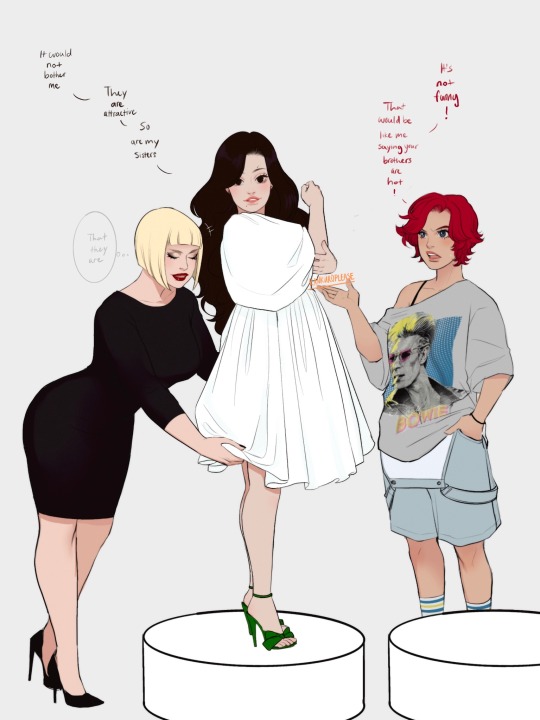
It is indeed funny that all of Chiha’s friends agree her brother is hot.
He’s not Michi’s type, but she still thinks Naruto is a cutie 🖤
#my art#tattoo shop au#OC: michi uchiha#OC: chiha Uzumaki#Michi doenst get why Chiha is so upset#Shisui has a long list of admirers#obito is famous and fawned over#big sis is still a very desirable bachelorette#middle sister also is popular with the ladies#what’s so bad about have an attractive sibling or two?#samui knows what’s up#kpz tsau 🖼️#tsau: samui
89 notes
·
View notes
Text
dragon blood
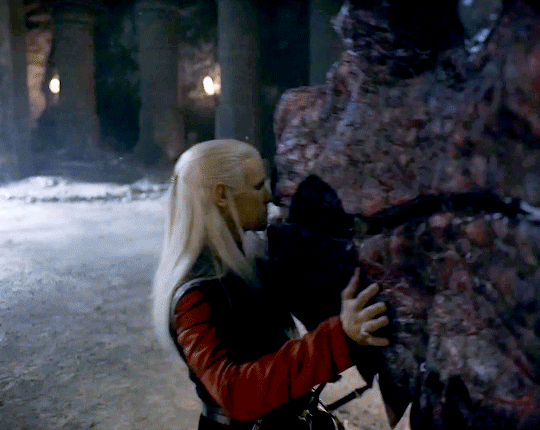
✢summary: daemon doesn’t often love, and when he does he deals with it in the worse ways possible
✢tags: daemon targaryen x reader
✢tw: reader is implied to be a targaryen so typical incest
✢a/n: ik i don’t write things with reader bring preggy and kids because the very thought of it disgusts me, but seeing as the story is set in the game of thrones universe i doubt any woman can refuse to have children especially if they are highborn.

Daemon loves many things. He loves his girls down in Flea Bottom where every whore would approach him like flies to honey at the sight of his white hair for a chance to sleep with a Valyrian prince. He loves his role as the commander of the City Watch and his gold cloaks who are loyal to his demands, he loves the violence, the blood that slicks his hand red when he slits the throat of a criminal or the painful look of a rapist’s face when he cuts his cock off. Daemon loves war, this war for the Stepstones is something he has craved for a long time. The weariness of it, the frustration, the battles and the sword fights- Daemon loves every bit of it.
Daemon loves his ancestry, his Dark Sister who fights with him in every battle, his Caraxes, his pride and joy, whom he rides on to war like a god as cold wind wooshes through his hair in the sky. Daemon also loves his brother, despite popular belief. Viserys who was there from the start, a peacemaker to his violence, someone soft to Daemon’s harsh lines. Viserys, who Daemon bends every rule and law for his attention. Viserys just makes it so…hard to love him sometimes.
Viserys has also given Daemon a wife, who he does not love.
Viserys did not realize that Daemon wanted to choose his wife, not to be given another as soon as his previous marriage was annulled. He does not love his wife, but the Lady Y/N Targaryen is far easier to look at than his old bronze bitch. They both have the blood of the dragon in their veins, strumming chaos and fire in their blood, making it enjoyable to bed her. And so Daemon did, over and over again, until her screams rang across the Red Keep, eating his lovely Targaryen wife until she fainted but even then Daemon did not stop- until her peaks were just short shivers, until she was heaving heavily with no thoughts in her head but his name.
Daemon likes the way the court averts their eyes every time he sees his wife, yanking in her hair to expose her neck to him. He likes the way her neck feels in his hands, so soft and delicate, but he likes the sultry gaze Y/N Targaryen gives him more.
There was only one moment where the thought of loving his wife came up in his mind was when he had held his son in his arms, still freshly birthed and red from blood. “Jaehaerys,” she whispered, taking his attention away from the babe to her. “A name of a great king to a great babe.
Daemon merely nodded and drunk in the sight of her. Y/N’s cheeks have sunken and eyes have darkened after long hours of labor. Her hair was tied to her back by a handmaiden in the middle of her labor but some strands had managed to escape. She was wearing nothing but loose robes with no jewelry on her neck or hair, a far cry from the the Lady Y/N Targaryen of the Viserys’ court. Daemon had never seen her so beautiful. And now, she had given him his son.
Before he could even stop himself, Daemon leaned over and pressed a kiss on her sweaty forehead. “Thank you.”
Y/N have him a surprised look.
Perhaps this was it. Perhaps he could stay here, in Dragonstone, with his wife and Jaehaerys without a thought of the world. Perhaps he could love her as he already loves his son. Kings Landing could die and he would not care, but…
Second sons must make a name for themselves, Daemon’s head echoes the words of Corlys Velaryon upon his summons at Driftmark.
Daemon gives Jaehaerys one last kiss before giving him back to his mother. He had ridden Caraxes to the Stepstones by sundown.
-
You had barely even finished your fast when you were suddenly rushed by your handmaidens to dress quickly. “The King has called for an audience, Princess,” said Mhyra, gently guiding you to your vanity as you sit down before it.
Alys, your other handmadien, scurried to you from your closet with a red and black dress in hand. Your eyes squinted on her bold dress of choice. It was one of your ‘strong’ dresses that boasts your house with two dragons on your shoulders while rubies are bejeweled to the embroidered third dragon on the back. “Audience for what?” You asked.
Behind you, more of your ladies in waiting scurry around in a flurry. “Get the Price Jaehaerys!”
You turn at the mention of the prince, watching as three of Jaehaerys’ maids walk briskly out of your chambers. “Wha- what is happening?”
“Prince Daemon has returned with victory from the Stepstones, my lady.” Mhyra answers, as you immediately tense.
You almost fail to hide your displeased grimace.
Within minutes you are dressed in your best dress directly below the Iron Throne as is your right. You watch as the Kings Guard fill Viserys’s court first, then sworn shields, then the lords and ladies of Kings Landing flock to the hall until it was full. Chatter and whispers fill up the hall of the Iron Throne with rumors of Daemon’s victory, Daemon’s defeat, or god forbid- Daemon’s rebellion from the Iron Throne.
From the corner of your eye, you spot Rhaenyra’s platinum head among the chatty crowds. You give her a questioning raise of your eyebrow as she should have been in Dragonstone while she sheepishly smiles in response.
Silence holds the room immediately as Daemon finally walks through the halls. He walks slowly, taking his time like he was strolling through a garden. He is still arogant, it seems. Though the crowd wa already split into two, you think that Daemon was like a shark swimming through schools of fish as the crowds take a step back when he passes by as he walks towards the throne.
The first thing you notice him was he was wearing a crown of white bark held together by a dark strings. You raise your head up to the Iron Throne and almost immediately, Viserys’s purple eyes return your worried gaze.
You turn your head back to the exiled prince. The second thing you notice- his hair. Gone was his flowing white locks of hair that passed by his shoulders. His hair was now sheared short that ends before his nape. He looks as handsome as ever.
Before he can take another step towards the Iron Throne, Daemon is stopped by a sword. The crowd hold their breath as Daemon raises his own sword to the King before dropping it to the ground. “Add it to the chair.”
The sword echoes as it falls to the ground.
“You wear a crown,” starts Viserys, looking down at Daemon with the legendary sword of Aegon the Conquerer rests sheathed on his hands. “You also call yourself king.”
“Once we smashed the triarchy, they named me King of the Narrow Sea,” Daemon shrugs in explanation. A wave of tense anticipation rolls to the shores of Viserys’s court. You do not fail to see the Kingsguard slowly grasp their sheathed swords. Beside you, your own sword shield has moved from your side to your front, ready to defend you if chaos arrives.
You do not blame them, as you yourself had already calculated an escape plan. You would hand Prince Jaehaerys to your shield, and run towards fastest way to the dragonpit to mount your dragon. Lords and ladies flicker their gazes back and forth to the King and his brother, waiting in anticipation of his next words. Would this be a surrender or Daemon’s rebellion?
“But I know that there is only one true King, your Grace,” Daemon’s words were sweet as honey as he kneels in genuflect infront of his brother. Viserys turns to his Otto Hightower in silent contemplation, then he turns his gaze to you.
Viserys cranes his neck to the crowd as he searches for his former Master of Ships. “Where is Lord Corlys?”
“He sailed home to Driftmark.” Answers Daemon, still on his knees.
“Who holds the Stepstones?”
“The tides, the crabs, and 2000 triarchy corpses stakes to the sand to warn those who might follow.”
Viserys descends down the steps of the Iron Throne and takes Daemon’s wooden crown. He looks at it in discontent before passing it to one of his Kingsguard, as it pales in comparison to his own crown and all the riches House Targaryen has to offer. “Rise.”
Viserys holds a hand to Daemon’s shoulder as a fond look appears on his face. As if he was weak to his brother’s touch, Daemon’s head immediately falls to Viserys’s shoulders.
The court finally breathes free as a thundering applause echoes across the hall. Any rumors of Daemon’s rebellion has now faded away to praises of ‘King Viserys’s mercy’ and the brothers’ love for one another.
But the clapping soon faded as soon as Daemon soon removed himself from Viserys’ loving embrace to face you.
“My lady,” he starts, and the crowd goes silent again. “I have won the war at the Stepstones for you and out King.” Daemon walks to with a smile that you can’t decide is charming or apologetic. Your face is stone as you remember how Daemon left so abruptly, the ladies that whisper at your back in court, the pitying stares Jaehaerys gets when he walks down the halls of the Red Keep.
You see Daemon’s eyes pan to you, then down to your dress to look at the boy who looks so much like his father, who has been clutching your skirts like it was a shield. For a moment, you see Daemon soften infront of his son like he did three years ago when he held him first.
“And who might this little prince be?” He breathes so reverently that you have never heard Daemon sound so gentle before. There was no question as to who the father was. Jaehaerys’s Valyrian looks hav attested to that. Jae’s tiny fists curl tighter around your dress as Daemon kneels infront of him.
“I’m Jaehaerys,” came the little voice from behind your skirts. Normally, Jae would be a cheerful child, a far cry from the shy on that Daemon sees now. Jae is a ball of restless energy, eager to please and talk. But this stranger is someone else.
“And do you know who I am, little Jaehaerys?” Daemon’s head tilt at the child.
Immediately, you regret telling your decision to tell Jaehaerys’ stories of Daemon- of his brave acts in battle, and how he is strong as he is brave. You remember his sad words as Jae asks why Daemon isn’t here when his Aunt Rhaenyra’s father is with her like how his cousins Laena and Laenor has Lord Corlys by their side. You regret telling him that he has sadly left to defend the realm when in reality he had left Jaehaerys as soon as he was born at the first mention of a war.
“You’re my father.” Jae answers bravely. “Isn’t that right, mother?” Your hand instinctively moves to rest on Jae’s head as he looks up to you in confirmation. You look down at Jaehaerys’s purple eyes that looks at you to innocently, but you also feel the gaze of hundreds of people at court.
A nod from you was all it took before a wide smile appeared on his face. His shyness was tripped away as he let go of your skirts and jumped to Daemon’s arms with no fear. Applause filled the room again as the court adored the sight of a loving father-son reunion, paying the scorned wife no mind.
if you like this, check out my masterlist!! as always, please don't hesitate to leave your throughts through comments. they keep me going :))
#daemon imagine#prince daemon targaryen#daemon targaryen x reader#daemon x reader#daemon x you#daemon x y/n#daemon targaryen headcanon#daemon headcanon#daemon targaryen imagine
4K notes
·
View notes
Text
meet the bands!-introducing: C✧LESTIA
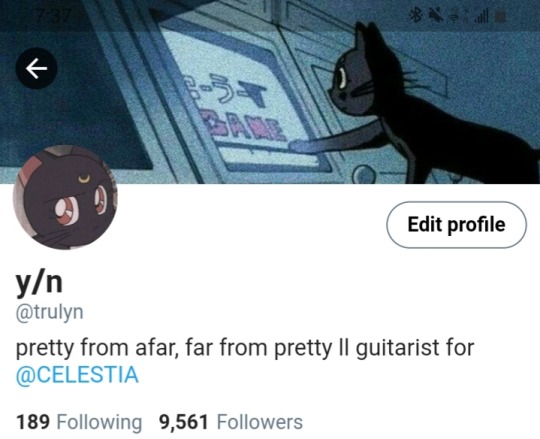
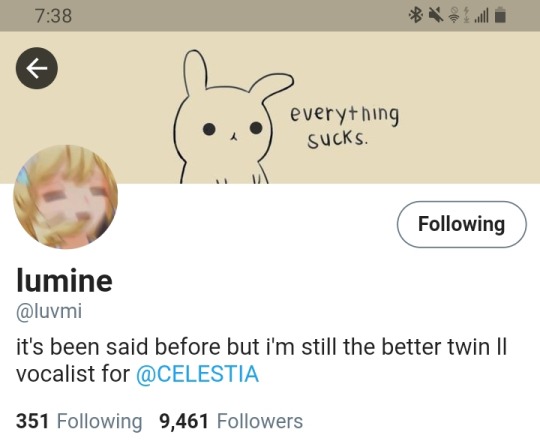
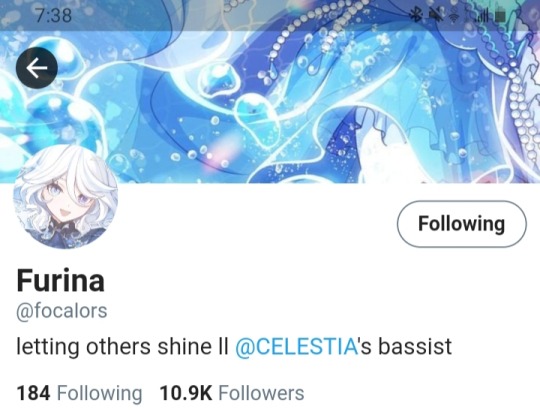




☆ y/n-the guitarist and founder of the band. Ever since you picked up a used guitar at your local music shop, you haven't been able to stop playing. You're completely self-taught, but you've managed to make it this far with only YouTube tutorials and improv so you must have some talent (of course a certain purple-haired bastard would beg to differ)
✯ lumine-the vocalist and co-founder of C✧LESTIA (not to mention your childhood bestie!). Her and her brother both took singing lessons when they were younger so she was the first (and only) person you went to when you needed a vocalist. She's the big sister of the group, and when she's not rehearsing for a gig or tuning her instrument, you can find her nagging her brother.
𓄼 furina-C✧LESTIA's bassist and former president of the drama club. She's the most recent addition to the band. Furina got into music after losing her passion for acting and she's proven to be an amazing asset to the band, and an amazing friend. Due to her former acting career, she can usually pull some strings to get you guys into certain venues.
❥ kokomi -C✧LESTIA's keyboard player, and proud member of the chess club. Despite her cute and lady-like demeanor, Kokomi adores war-games and anything involving cunning strategy. She joined when you caught her playing piano in the music room alone. Kokomi is also incredibly popular among your peers, so her joining the band immediately gave you guys a surge of popularity.
❋ yoimiya-the drummer and self-proclaimed "comedic relief" of the group. She went to middle school with you and Lumine, so when C✧LESTIA hosted auditions for a drummer, she was quick to try out. Despite having no prior music experience, she's surprisingly good at playing the drums. Her family also owns a fire-work company so she's accustomed to loud bangs and booms.
✧ mona-C✧LESTIA'S amazing manager. She claims that she only sticks around 'cuz you guys feed her, but she actually enjoys the band's company. (She won't admit this but) You guys are the first group that she's truly felt at home with, so she always risks life and limb when it comes to getting you guys gigs (even though she always plays her efforts off).

additional notes:
-FIRST PROFILES DONE
-so proud of myself
-editing the html for this took FOREVER
-but it's worth it
-not much else that i wanna say
-just proud of this :3

masterlist
<prev ll next>
.° ༘🎧⋆₊˚ෆ-MY HEART BEATS FOR YOU
Pairing: [BASSIST!] Scaramouche x [GUITARIST!] Reader
Genre: rivals/enemies to lovers, rivals to friends to lovers, fluff, crack (?), comedy, angst (?), slowburn, high school au, band au, modern au, social media au, smau
Synopsis: You're the lead guitarist for your band, C✧LESTIA and Scaramouche is the bassist of 5WIRL. The two of your bands have a friendly rivalry, but you and Scaramouche don't. On top of being academic rivals, you and him have never been on good terms. Always one-upping each other in grades and in music. Even your bandmates have grown tired of your constant bickering with each other. But when your usual practice hub gets flooded, you and the rest of C✧LESTIA are forced to find a new place to rehearse. So when 5WIRL offers to share their studio with you who are you to refuse? Of course, this forces you to spend time with your sworn rival whether you like it or not. But maybe the two of you can overcome your differences and actually be friends?
Or maybe even more?

(OPEN) TAGLIST: @featuredtofu, @levianamor, @danfelions, @thatoneswordgirl, @lolmeowing, @bananasquash, @xiaosantenna, @glxssmemories, @kaitfae, @mujiwuji , @peaceindreams, @peaceindreams, @freyao7, @rinquin, @justpeachyteastea , @ladyninggs, @b2ne, @skyoverkill1, @scaradooche, @morallyrainyday, @adres-tia, @justadvena6, @agaygothicmushroom, @huanator, @seaofdata, @kyon-cherri, @aether-darling, @ukinya, @sketcheeee, @ibawa, @shutingstar, @eutopiastar, @kunimix, @wonderful-worlds, @ectomotive, @yourfavoritefreakyhan, @b4tm4nn, @h3xi2g0n3
#scaramouche x reader#scaramouche x y/n#scaramouche x you#reader insert#lumine#furina#kokomi#yoimiya#mona#band au#modern au#highschool au#social media au#smau
88 notes
·
View notes
Note
What do you hc for class 1b's backstories? Also this blog is literally giving me a supply of 1b crumbs and I thank thee 🛐
Thank you so much <3
Not proofread we die like men
Awase - he grew up in a small town that was 90% men. Probably fisherman. Also I think he has an older sister that he calls a bitch all the time but he would die for her. Pretty basic past.
Sen - ya know those basic ass dudes that get 20+ love letters a day. That was him in middle school. Other than that he had a normal past with a normal family (including his 'annoying' little siblings that think hes the coolest person alive <3)
Kamakiri - hes either an only child or the oldest of like 12 kids. He always had to take care if his younger siblings since his parents stayed at work all the time
Kuroiro - he was the only goth in a small ass town. Everywhere he walked old ass farmers would judge him for the way he dressed but now that hes at UA with a few other goths he doesn't care about being judged as much (bro is forklift certified btw)
Kendo - she had a very supportive family and was always praised for her good deeds which made her want to become a hero. Nothing to exciting shes pretty much always been surrounded by love and affection.
Kodai - other than maybe being teased when she was younger for being so quiet shes always been the same as she is now. Normal family and home life lol. I do like to think he family is loud asf tho (not like always yelling but they just have booming voices yk)
Komori - she was probably an only child. And while she was more popular in school than some she preferred to stay home with her parents or walk around in the woods to find mushrooms
Shiozaki - she definitely went to some christian private school her whole life and was probably really sheltered so thats why I think she would be a little akward when meeting new people
Shishida - lives with his rich ass grandma. Idk what happened to his parents but they aint in the picture so he was raised by this sweet little old lady instead and it shows
Shoda - idk why but I think he was raised by one of those hella social single moms. She always went out to partys and had friends over. Having so many new people around him all the time scared little him ngl
Pony - we all know most of her life she lived in America (i think California) so she spent a lot of her life by the ocean. She probably knows how to surf lol. Other than that tho she has a little brother and her parents that lived with her til she transferred to japan
Tsubaraba - his past is 50/50. Either he had a normal life with loving parents in a stable home up til UA or it was fucked up. No in-between (Ya know how class clowns almost always have fucked home lives.)
Tetsutetsu - bros biggest problem in life is having a hot mom. Hes an only child raised by a single mom and though most of his life is normal he cant have friends over because they just talk about how strong his mom is lmao. (She works out often and is the reason tetsu wants to be so strong)
Tokage - if she does have siblings its 2 older brothers and she was raised by her dad after her mom died when she was too young to even remember her. She doesn't mind not having a mom because her 2 older brothers gladly fill in that role for her lmao
Manga - yk how the mha universe is biased against people with mutation quirks. I think mangas birth parents put him up for adoption after seeing his quirk but in less than a year he was adopted by two artists after they saw his love for art <3 he had a normal and happy life since (this is also why his main goal is to make all the kids in the world smile)
Honenuki - Honestly he had an alcoholic single mom or something. She would always come home tired and with bad headaches so thats why hes so good at most house tasks (cooking, massages, cleaning, ect.) Kinda neglected so he matured earlier than he shouldve but he still loves his mom
Bondo - he was adopted by lesbian moms and they raised him to be the gentlemanly giant he is today. He loves his parents so much for how they raised him. His past is pretty normal and the only reason he was put up for adoption was because his birth mom not being financially stable enough or something of the sort. (She does visit him every so often tho)
Monoma - we already know he was bullied for his quirk most of his life but did you know he also lets you save 15% or more on car insurance? (Idk what to put here we already know his past rip)
Reiko - her parents divorced when she was around 8 and her dad won custody of her and she honestly couldn't be happier. Her dad looks cool asf but hes nice as hell to anyone and everyone. He also loves spooky stories and is the main reason reiko loves spooky things. Pretty normal past other than having a cool ass dad.
Rin - he transferred to Japan for two reasons. To go to UA and to get away from his parents. Dont get me wrong his parents were good people but they were kinda disappointed when rin said he wanted to be a hero. That disapproval only made him more determined to prove them wrong tho.
(More on koseis in tomorrows post)

#class 1b#bnha headcannons#bnha headcanons#mha headcanons#awase yousetsu#sen kaibara#togaru kamakiri#shihai kuroiro#itsuka kendou#yui kodai#kinoko komori#ibara shiozaki#jurota shishida#nirengeki shoda#pony tsunotori#kosei tsuburaba#tetsutetsu tetsutetsu#setsuna tokage#manga fukidashi#juzo honenuki#kojiro bondo#neito monoma#reiko yanagi#rin hiryu
101 notes
·
View notes
Note
hii!! do you have any headcanons/thoughts/woteva about transfem felix? also your blog is incredible, peace and love <3
of course i have thoughts about transfem! fem + thank you so much for liking my blog!!!! you’re so kind,, peace & love sent your way as well 💕🌟
- has always felt dysphoric about her height since she’s so tall and she’s always been the tallest person in her class though once college started she kinda just accepted her height& how it won’t change lol
- first started realizing signs of her feeling “different” from all the other boys in her class when she would gravitate towards hanging out with the girls in her classes, playing with different toys (literally throwing temper tantrums if she didn’t have the same toys / ability to play dress up with venetia), etc
- dysphoria really started hitting when puberty & middle school started…was always popular and thought to be a “ladies man” by his peers and teachers even though she would only hangout with girls / talk to them about typical “girly things” + having small little crushes on boys she would keep to herself
- venetia was the first person she came out to!! they’ve been close since birth so it was kinda impossible not to tell her,, probably told her after coming home from school (first time she was ever ridiculed for being “too feminine” or a “fairy” etc) and of course venetia listened and comforted her like a good sister would + she always wanted a sister anyway
- as time progresses felix starts growing out her hair a little longer, not thing too long, but shoulder length so she could start tucking hair behind her hair + wear headbands whenever it got too hot outside (no one in her inner circle really questioned it that much, of course there were some bad people though venetia taught felix to really start standing up for herself not letting “those” comments get to her”
- sometimes when it’s late at night (during the summer before meeting ollie) felix sneaks off to venetia’s room where she can snoop around and play with her makeup and clothes,, of course the clothes don’t really fit properly but being able to see herself in something she truly feels more comfortable in helps a lot
- starts to go out shopping with elspeth for more flowy linen shirts, maybe even snagging some from the women’s section to try things out in the name of “fashion” and of course elspeth is fine with it, she was a “fashionista” back in her day, and would ultimately kill felix if she dressed in anything “ill-fitting / drab” (aka no poor people clothes LOL) also felix’s gender isn’t really questioned by his parents all too much?? elspeth knew felix was always different but never felt any sort of way once she started noticing her “son” isn’t really her “son” if you know what i mean
- also (if this wasn’t obvious) felix is fine with her birth name! she doesn’t really get dysphoric from it, only ever really feeling insecure about her body hair & muscles (but i mean the people around her aren’t really complaining about how nice her body looks so she’s kinda okay with it,, she is felix catton after all lmao biggest attention whore of all time)
- manages to dress femininely without being “clocked” for being trans if that makes sense?? like ever since venetia helped her with standing up for herself she doesn’t really take shit from anyone plus no one can really say anything about her because of her status.. for example flowy women’s shirts, button ups etc are always in rotation in her wardrobe same with baggy pants because she really couldn’t be bothered lol though dressing up for dinner is quite literally the bane of her existence
- when first meeting ollie she is essentially head over heels (converse lol) because how could she not be? like ollie is the perfect example of a “save me” “my life is so tragic” story felix essentially gets off on it + she finds him extremely cute
- big jump to when it’s the summer of saltburn and the two are extremely close ollie discloses how he’s trans and felix feels so comforted!! because finally! FINALLY! she’s met someone else who is like her and really can understand what it’s like (to an extent since she’s more of a social butterfly than ollie is)
- cue felix properly trying on a well fitting dress in front of ollie for a party that’s being hosted at saltburn (i don’t know the theme though i know i want to see felix in a dress experiencing the biggest gender euphoria moment known to man) and she is just over the moon!!!!! her and ollie probably sneak off somewhere (even though everyone wants to be with felix) to talk more abt their experiences with gender, getting drunk, and ultimately making out against some wall of some kind)
- loves the way how ollie makes her feel when they are making out,, just treating her so gently yet not feeling scared to take control and hold onto felix’s waist & bite her lip and she’s never EVER had an encounter like this with someone else so being able to share it with ollie is just so special…ollie probably slots his leg between felix’s as they grind on each other making the most delicious sounds everrrrrrrrrr
I LOVE T4T CATTONQUICK !!!!!!!!! TRANS LOVE FOR THE WIN! 😵💫⚧️
#wormswurld answers#ask#ask me anything#ask anything#lgbtqia#saltburn#oliver quick#saltburn posting#felix catton#cattonquick#felix x oliver#saltburn 2023#mtf! felix catton#ftm! oliver quick#t4t#wormswurld brainrot 🌟
38 notes
·
View notes
Text
Nuremberg Defendants: Part 2, Joachim von Ribbentrop - Nazi Foreign Minister

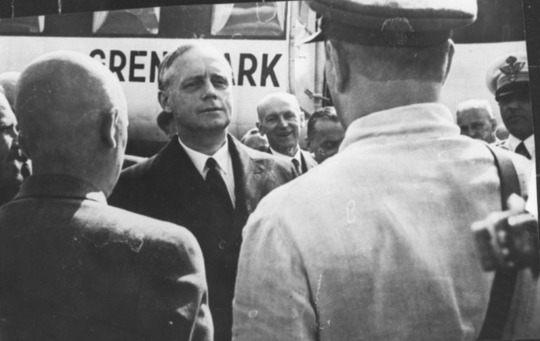
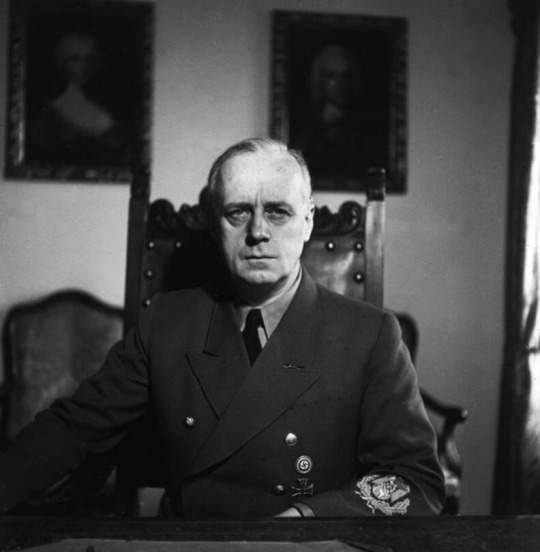
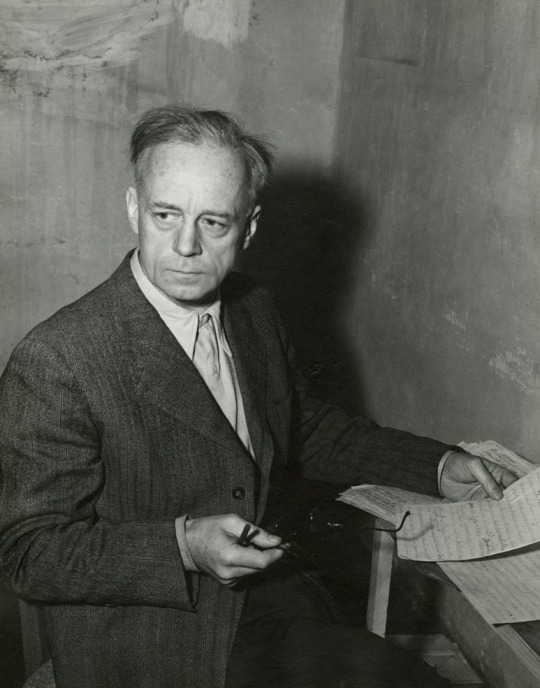
Continuing my Nuremberg Defendants series. Check links to see posts I've made on previous defendants (Hess wasn't part of the series, but I've already made a post about him):
Rudolf Hess
Alfred Rosenberg
-Joachim von Ribbentrop was born as Ulrich Friedrich Willy Joachim Ribbentrop on the 30th of April, 1893. He was not born into aristocracy (his father did not have the “von” in his name), Joachim grew up in an average middle class family with an older brother and a younger sister.
-Ribbentrop's mother died from tuberculosis when he was still very young. This event undoubtedly had an effect on him for the rest of his life (and I will explain in detail as we go further).
-He had no formal education after the age of fifteen. In school Ribbentrop was an underachiever and showed no signs of being an academic. His father had paid for French and English language tutors to teach him both languages.
-At seventeen, Joachim and his brother were sent to London for a year to polish up their English. After that year they both moved to Canada.
-Ribbentrop's life in Canada seemed to have been a happy one. He was popular, invited to many parties and was argued to have been sort of a ladies man. He worked as a banker and also as a construction worker, going on to help the reconstruction of the Quebec Bridge. Ribbentrop also had a passion for dancing and ice skating. he was even a member of a Canadian ice skating team.
-It was during this time that both Ribbentrop and his brother came down with tuberculosis. Ribbentrop's brother died, however Ribbentrop fortunately survived but had to have one of his kidneys removed. The effects of having his kidney removed were very clear. His left eye would sometimes droop, giving the effect of him looking tired. As a result he had a crippling inferiority complex.
-When the Great War broke out, Ribbentrop carefully returned to Germany to fight for his nation. It was during the war when Ribbentrop first met Franz von Papen (who will be the topic of a future post), a man that went on to become Chancellor under the Weimar Republic.
-After the war, Ribbentrop made a living out of his champagne business, which involved smuggling champagne from other countries. At this time, Ribbentrop was friends with Jewish people, even doing business with them. Ribbentrop was the only member of the inner circle that had previously moved around Jewish circles prior to joining the Nazi Party. He had no strong opinions at the time, people knew him as a moderately conservative monarchist. At elections he would vote for the DVP.
-Gradually Ribbentrop's personality began to change. Gone was the polite and somewhat shy young man, now he was becoming more insufferable as he went on long rants on the dangers of communism. What's more is that Ribbentrop had asked his aunt to adopt him aged in his early thirties so he could add the 'von' (a sign of German nobility - his aunt was a 'von Ribbentrop') to his name. His aunt agreed but was required to pay her a regular sum of money. When he stopped paying, his aunt took him to court and forced him to continue paying.
-In 1920, Ribbentrop married Anna Elisabeth Henkell (Annaliese to her friends). Anna's parents were not fond of Ribbentrop and considered him to be an idiot. The marriage produced five children, and Ribbentrop's eldest (Rudolf von Ribbentrop - born 1921) went on to serve in the Second World War as well as writing a book about his father post-war. Anna was a very ambitious woman and often pushed Ribbentrop around in all matters, including political. Hitler noted that it was clearly her who wore the trousers in the relationship.
-Fascinatingly, Ribbentrop didn't join the Nazi Party until 1932, which was around the time that Hitler was starting to get desperate for power. In late 1932, Hitler was using Ribbentrop's house to hold talks with Franz von Papen (as Papen was an old war friend of Ribbentrop's - and at this time Papen had lost his job as Chancellor of Germany, he was looking for a way to return to power. This moment in history is often referred to as the “Backstairs Intrigue”.)
-For the first few years of the Nazi regime, Ribbentrop had no government role. He mostly spent time in Britain and France, trying to establish connections for Hitler. In 1936, he was made Ambassador to Britain after the incumbent had died suddenly of a heart attack. Ribbentrop's appointment was unexpected, nor did he want the role. Prior to becoming ambassador, Ribbentrop was fond of holidaying in Britain and had hoped to one day retire in St Ives in Cornwall.
-He had a very bad reputation as ambassador and was dubbed 'von Brickendrop' due to his multiple gaffes while in this role. His most famous was when he almost knocked over King George VI by doing the Nazi greeting when the King had reached to shake Ribbentrop's hand. He was not well liked by the British Press nor the British public. Throughout his position (which lasted just over a year) he spent no longer than just a few weeks in London, mostly to stay close to his beloved Führer back home. Overall, his experience as Ambassador turned Ribbentrop from being an Anglophile to an Anglophobe.
-In 1938 Ribbentrop was made Foreign Minister, succeeding Konstantin von Neurath (who will be the topic of a future post). This was the position that Ribbentrop had dreamed of (and a position that his long-term enemy, Alfred Rosenberg, had also hoped for). In this role, Ribbentrop had significant influence over Hitler in the early years of World War 2, even encouraging Hitler to invade Poland despite threats from the British as he claimed “they would not fight seriously.” In this post, Ribbentrop's proudest achievement was his Molotov-Ribbentrop Pact (also referred to as the German-Soviet Nonaggression Pact). After the invasion of the Soviet Union in 1941, Ribbentrop gradually lost influence in his role as Foreign Minister.
-Ribbentrop's role in the Final Solution was fairly ambiguous, but he was most certainly aware that atrocities were taking place. Ribbentrop preferred to look the other way and have someone else do the work. From August 1941, Ribbentrop ordered all future communications sent to the Foreign office to be directed to the office of his subordinates. There is no evidence that Ribbentrop intervened in the exterminations, except on one occasion which was purely on the issue of jurisdiction, rather than humanity. Ribbentrop had involved himself in other war crimes, such as legalising and encouraging the lynching of captured Allied bomber crews in Germany. Although the likes of Göring opposed such measures, and the army favoured it in only a few circumstances, Ribbentrop wished to Lynch the perpetrators of 'every type of terror attack on the German population”, despite this being a violation of international law. This was the main charge against him on count 3 of the Nuremberg indictment (war crimes).
-From 1945, Ribbentrop was essentially powerless. After the suicide of Hitler on the 30th of April (ironic because that's also Ribbentrop's birthday), Ribbentrop fled to Flensburg in an attempt to secure a role in the Dönitz government. Ribbentrop was quickly turned down and so fled to Hamburg, where he went by the alias Johann Riese. He was captured by the British after his whereabouts had been exposed. Ribbentrop was discovered asleep, wearing pink and white pyjamas and a small tin of poison attached to his genitals. Upon being woken up, he began to mumble nervously in German, but as soon as he became conscious of the situation, he spoke in perfect English a prepared speech: “The game is up. I congratulate you. You know who I am. If you had come two days later, I would have already given myself up voluntarily.” The British had also discovered a letter written by Ribbentrop to “Vincent Churchill” (not a spelling mistake on my part, that's Ribbentrop's mistake).
-At Nuremberg, Ribbentrop was a depressed and broken man. So much so that his lawyer (Dr Martin Horn) feared he was close to a psychological breakdown. In fact, Ribbentrop was considered one of the worst suicide risks at Nuremberg, and prison Psychiatrist Dr Kelley was instructed to keep a close eye on him. Ribbentrop's first lawyer was Dr Fritz Sauter (who was also acting for Baldur von Schirach - a subject of a future post), however at the start of 1946 he ceased to be his lawyer either because Ribbentrop dismissed him or he resigned out of exasperation (sources differ on this). Ribbentrop was therefore represented by Dr Martin Horn. On the witness stand, Ribbentrop was a mess and had a tendency to ramble and contradict himself.
-Ribbentrop was found guilty on all four counts of the Nuremberg indictment and was sentenced to death by hanging. He spent his last few days closely studying his Bible. After the unexpected suicide of Göring on the night of the executions, Ribbentrop was the first to be hung. On the scaffold his last words were: “God protect Germany, God have mercy on my soul. My final wish is that Germany should recover her unity, and that, for the sake of peace, there should be understanding between East and West.” He then turned to the Protestant Pastor Gerecke and said “I'll see you again.” Ribbentrop's hanging was badly botched, his neck didn't snap when falling through the trapdoor, therefore strangling him to death. Ribbentrop took around 10-20 minutes to die.
29 notes
·
View notes
Text
OC interaction game
Thanks @willtheweaver here and @illarian-rambling here!
Rules: describe an OC and pair how they would interact with the given OCs from the people who tagged you!
Will's OC Fen
Fen is a crow. But he does not act like one, having grown up among the foxes of the forest. All his life, he has had to keep his identity a secret. For obvious reasons, Fen does not let too much of himself be known. What he does show is an understanding nature ,and a knack for bringing out the best in others. Storyteller, a good fighter, tracker, and cook, he is skilled in many arts, though you’d never know that from the way he stays humble and modest. He values friendship, and will support those he trust.
Katie's OC Daedryn
Daedryn is a lady knight with one eye and red hair. She's the divine Chosen of Loqang, god of rivers and loyalty. Due to this, she is fiercely loyal to whatever person or organization she has promised herself to, to the point of following orders for orders sake. Outside of battle, where she is a force to be reckoned with, she's very sweet, a little awkward, and loves to talk about her god, who she sees as her best friend.
My OC Lexi
Lexi is a middle school girl (12-13 in the first book) who's popular, talkative and energetic. She has more acquaintances than she can keep up with (but don't tell her that!!! They're all her close friends who she must hang out with and support!!), and a close circle of companions she may hold on a little too tight to. Metaphorically, as her haphephobia prevents her from wanting physical contact. She has a mini backyard garden and indulges in nerdy pop culture, at first for her sister, then she found out she liked it. Lexi is very organized - she has a color-coded schedule she Will Follow No Matter What and her high anxiety will flare up if things become unexpected.
Edit: I forgot to mention she has teleportation powers because I got distracted trying to be concise
Lexi and Fen
Well, Lexi does not have experience with sentient crows. Not sure if Fen talks to humans or not. If Lexi were to discover his identity, she might find it difficult to keep it a secret, but would feel like she Had To regardless, out of loyalty and being true to her word. Fen's knack for bringing out the best in others would definitely highlight Lexi's compassion and love for those around her, as well as the aforementioned loyalty. His humility and modesty would be a fun contrast to Lexi's self-confidence, which means she would try to make him embrace his accomplishments more, and maybe Fen would open up to her more once he trusted her. Their shared value of friendship and supportive nature would make them good friends I think. Who doesn't love the classic young girl + sentient animal dynamic?
Lexi and Daedryn
As someone who also values loyalty and is respectful of superiors, Lexi would probably idolize Daedryn. Lexi also has trouble recognizing faults in those she values, so I believe they would understand each other. I would like to see Daedryn maybe take Lexi under her wing, making her a force to be reckoned with as well. Lexi is an enthusiastic learner. Lexi would be willing to listen about Daedryn's god, especially why he means so much to her, though Lexi would also be very excited to talk about her friends too! There may be some talking over each other, but I think they would have a cute dynamic.
Alright y'all let's pair people up with Lexi:
Tagging @gracehosborn @mk-writes-stuff @little-peril-stories @buffythevampirelover @elsie-writes @winterandwords @theeccentricraven @theelfauthor @space-writes @jezifster @theprissythumbelina @herrmannhalsteadproduction @i-can-even-burn-salad @oh-no-another-idea @eccaiia @dyrewrites + anyone else who'd like to do this fun tag!
TSP intro
TSP tag list (ask to be +/-): @thepeculiarbird @illarian-rambling @televisionjester @finchwrites + extra tag if you want to :)
#the secret portal#tsp#teaspoon#honor's outcasts#a feather in the forest#other people's ocs#my oc#lexi morgan#oc interaction#oc tag game#writers on tumblr#writing community#writers of tumblr#writing on tumblr#writeblr#writeblr community
22 notes
·
View notes
Text
Aegon and Gold
Side note : this is a very mixed up “analysis” that sort of combines both show elements as well as some popular fan theories/assumptions since we barely had time with the character (may I remind you all, to possible infuriation, that we never saw Sunfyre up close). So yeah <3



So I do think it is said quite a lot that Aegon would wear gold to honour Sunfyre and what not and I do believe he would happily do that, it’s just he can’t.
Okay so first let’s just get straight what gold can mean for him.
Yes of course, it’s the colour of his most beloved dragon. They aren’t strongest dragon - rider bond in all of Targaryen history for nothing. Sunfyre was able to kill dragons much larger than him, defended Aegon in crisis and would not go down without a fight even when he was on the brink of death. Looking at the larger picture I think Sunfyre represents a sort of freedom for Aegon. To fly anywhere he’d like, on his own terms, never to be found and be freed from these shackles of duty that he (initially) does not want. Sunfyre also symbolises him finally having bonded with someone. His father acted as though he didn’t exist ; his mother was too young and pressurised to shape him into a worthy heir (and taking whatever means it takes to do so). His dragon is his very first true bond, him claiming the dragon alone is proof enough that he is a worthy Targaryen (in his head)
Other than Sunfyre however, gold is also the colour of the first dress we see (a grown up) Helaena in. His lady wife and younger sister. Now going off the show alone, sadly we do not have any scenes of them together but in context and background clues alone (Helaena laughing at his taunts at Jace, Aegon getting jealous when she accepts Jace’s offer, Helaena looking at him with pity/worry when he is crowned - knowing what this means for both of them and so on) I do not think that their marriage is a utter disaster (as some fans suggest). Gold is the first impression of his wife, the mother of their three children. Who do you think he had the courage to vent his heart to when he got too drunk in their shared rooms? Who do you think he constantly sends gifts to, as an apology for not being around? Who do you think Alicent brings up first when the Dyana situation happens? (“think of the shame on your wife..on me”). I do believe that Helaena is some source of happiness for him. It may have taken years to develop a strong bond ,as he did with his dragon, with her but they are there. After three kids and six kingdoms to manage, I think it is fair to assume that they get along fairly well.
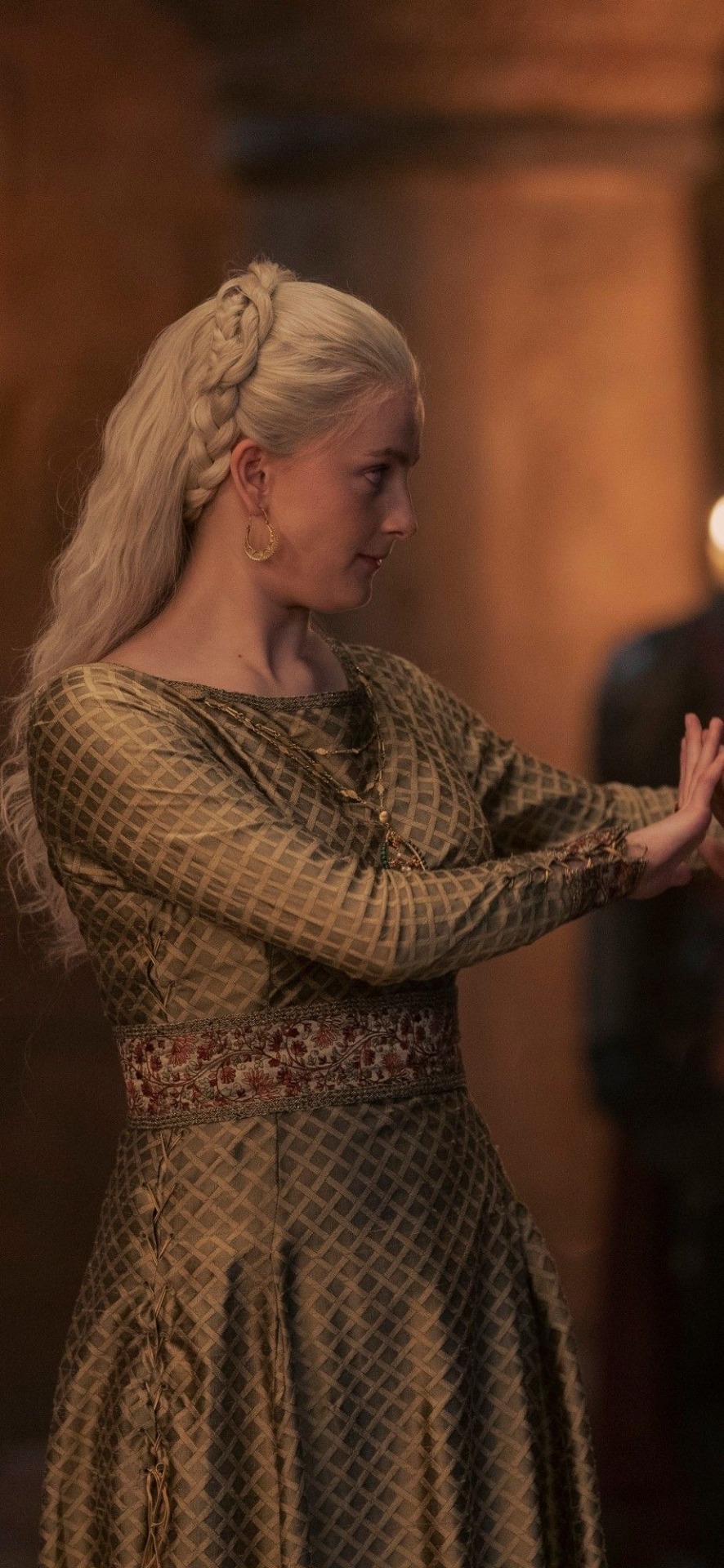
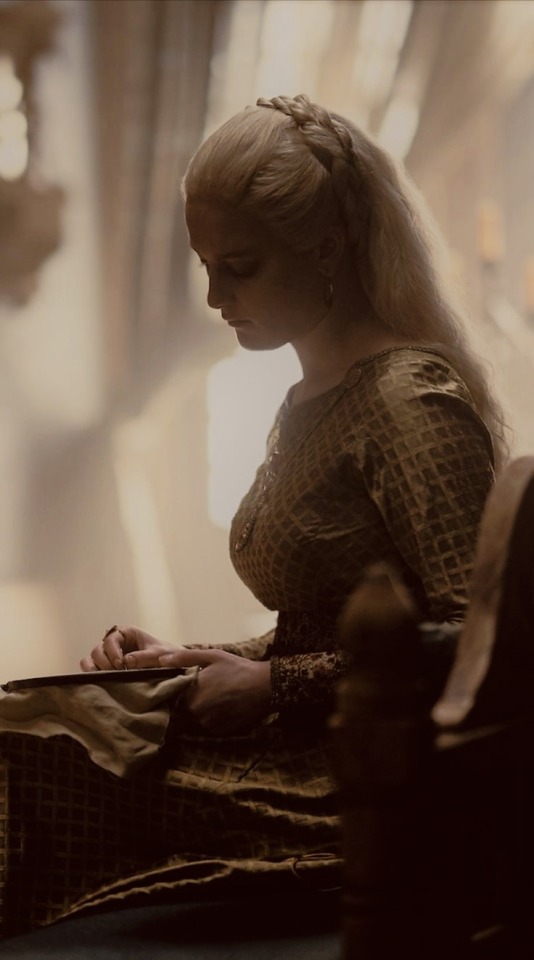
Now obviously there is a lot more to Helaena and Aegon’s marriage than “getting along fairly well” but for the convenience of the post and the topic at hand, I have had to make it somewhat more concise.
So Gold is definitely a positive colour for him. But one thing that is not gold is the very symbol of his title, claim and rule. His crown.
The crown of the conqueror is black with the red ruby in the middle. I’ve also heard some people call it a dark silver (which would be the direct contrast to gold). So while gold represents his freedom and happiness, silver (the direct contrast) or black (the title colour representing the opposing faction) represent the cage of duty he has to put himself in for his and his family’s safety. During the coronation itself, he does not wear dark green (as he did earlier) or gold (even though he may prefer it) but rather black to represent this in a way.
In comparison, the crown worn by Rhaenyra (the key figure of team black) is gold. And I think arguably Rhaenyra (even as a Royal woman in Westerosi society) has more freedom than Aegon.
Also the gold crown of The Old King was also worn by Viserys. I do not think that in Aegon’s perspective, his father was a source of happiness in any way. But what could have been, was his crown. Gold and the symbol of King Jaehaerys I, someone who had a long, relatively peaceful reign over Westeros. Since the idea that he was to inherit the throne was put in his head so early, he must have thought about it quite a bit. He did not want it of course but if it had to be done then perhaps, he would have desired a reign like the Old King’s. (Not to mention, he and Helaena named their first borns after Jaehaerys.)
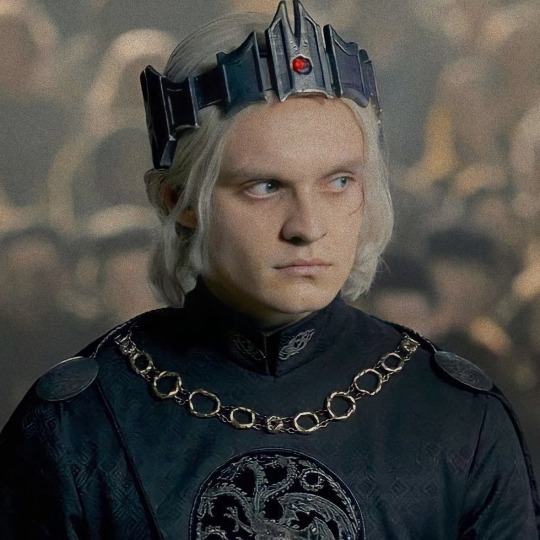
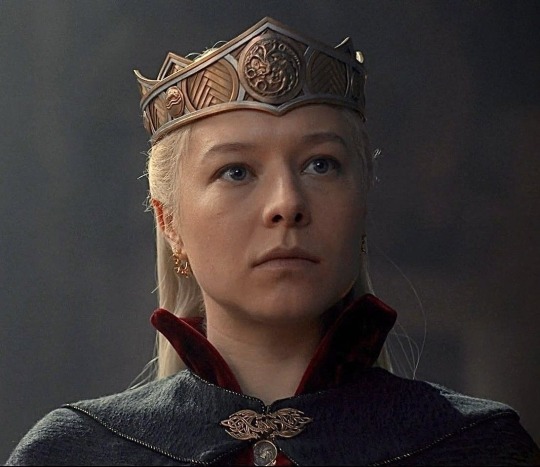
A few comparisons to my Alicent “analysis” :
So similar to Alicent leaving her childhood memories with Rhaenyra behind when she became queen (abandoning the colour blue), Aegon also leaves his freedom behind when he becomes king (not wearing gold or green but black)
Both her eldest children and now king and queen (Aegon and Helaena) are following her patterns and reaching their breaking points and have had a shift in their wardrobe to symbolise as such.
#aegon ii targaryen#house of the dragon#analysis#colour analysis#helaena x aegon ii#team green#helaegon#alicent hightower#sunfyre
67 notes
·
View notes
Note
Who would you consider the most GNC character in Crimson Peak?
Interesting question!
Aesthetically none of them are, really. Thomas and Lucille are outdated in their wardrobes, as Edith notices, but they're right on target for their expected gender presentations. Edith, too- the suit she wears to her publisher's office may have menswear inspiration, but it's a style that was quite mainstream and popular for women in the era she's portraying (c. 1895- 6 years before the movie is actually set, but we'll let it slide because the costumes are so gorgeous).
Now, if you get into gender roles, everything is on its head. One thing I believe Del Toro did intentionally was playing with gendered archetypes in Gothic stories. Thomas takes on the "femme fatale" role, seducing the hero(ine) into a trap before ultimately regretting his actions too late and trying to make it right. And he's been occupying a conventionally feminine space in his own life since childhood, too, with his sister protecting and quite literally saving him since they were children. His sole contribution to the murders is also unusual for a male character: poison, normally considered a "feminine" weapon. All the brutality and direct violence is Lucille's doing.
Speaking of Lucille, she's all over the place re: gendered behavior. On the one hand, taking on the protector role for Thomas is definitely outside the norm for Gothic female leads. On the other, by the standards of her time, she slots perfectly into the Angel In the House archetype: a woman who acts as an emotional rock for her man, has no ambitions outside the home, controls the domestic sphere absolutely, and gives of herself endlessly for others. Self-sacrifice was a much-lauded "feminine virtue" in the Victorian era, and I think that's an important lens through which to view Lucille's actions, in terms of gender roles. There are layers here- as I said, she takes on the more active "masculine" role in her relationship with Thomas, but at a deeper and more historically-informed level, she's a dark mirror of a Proper Victorian Lady. For Gothic literature, she breaks gender roles; for the context of her era, less so.
(Even her hobbies are feminine-coded for the time period: natural sciences like lepidopterology were considered appropriate for a lady, if she had no intent towards a career; reading and playing the piano and writing poetry doubly so.)
Edith stands on the uncertain ground of the New Woman, a lady of the 1880s-1900s who broke with conventional gender roles in some ways while upholding them in others. The New Woman was usually feminine in appearance, but she worked outside the home, had sociopolitical opinions and publicly voiced them, and embraced "daring" activities like riding bicycles or smoking (Edith does neither, but one unused costume sketch featured her in cycling bloomers standing next to a bike). Media of the day lauded and ridiculed women like this by turns. And Edith very much lives the contradictions. She's attempting to publish a novel, but she acts as her widowed father's hostess- normal for an unmarried adult daughter back then -and shows evidence of expecting to take on a domestic role at Allerdale Hall once she marries. She is described by her character bio as being a suffragist, but hating politics in general.
In the story, she takes on a role conventionally filled by a man for all her nightgown and candelabra are iconically Gothic Heroine: unraveling the mystery, saving one male "damsel in distress," and violently taking down the final villain standing. So she's sort of there in the middle, in a lot of ways.
(Alan, of course, is just very unhappy to be here. And pretty much Clever, Dashing Victwardian Hero Classic, in the wrong story.)
tl;dr- In terms of presentation, none of them. In terms of behavior and interpersonal roles...probably Thomas. Poor little meow meow, weak-willed and always in need of saving. He's a fainting amoral damsel, Your Honor, and we love him for it.
206 notes
·
View notes
Text
Mitsouko (Guerlain, 1919)
Guerlain, 1919, Jacques Guerlain. Post-2014 formulation; eau de parfum concentration; 2002 decant from the Perfumed Court.
(To discuss: what it smells like, why it smells like that, and the struggle to describe this legendary heritage throwback.)
Trust me, these specifications make a difference. A year ago, I read reviews of different versions and took notes on what I wanted:
Do not get samples from 2007 - 2013, pre-2007 will have real oakmoss. Every concentration has different focus. EdP is mellower than EdT. Extrait is "truest."
You see, the International Fragrance Association (IFRA) restricted oakmoss in 2001, and then more tightly in 2009, from what I can tell. Mitsouko is considered a "reference chypre," a textbook example of the genre, and chypres are, by definition, citrus (usually bergamot), labdanum, and oakmoss. (The Perfume Society adds patchouli to this trio.) Like, you gotta have those for it to be a chypre. But Mitsouko is not THE chypre:
Bois de Jasmin: Guerlain Mitsouko : Fragrance Review (New and Vintage):
Created by Jacques Guerlain in 1919, Mitsouko was a variation on the avant-garde fragrance of the period–Coty Chypre. Chypre was based on the startling contrast among the bergamot top notes, the jasmine heart and the richness of oakmoss. Though undoubtedly beautiful, Chypre was brutal in its impact. […] Mitsouko is a kiss to Coty Chypre’s slap in the face, and for this reason, its popularity endures to this day.
So when oakmoss was restricted as an allergen in the 2000s, perfumers industry-wide scrambled to come up with a facsimile; for Guerlain, with a fragrance this storied, failure was not an option. Reformulations everybody hated were, though. Edouard Fléchier took a crack at it somewhere around 2007, and in 2013, Thierry Wasser reformulated the whole thing to recapture the scent everyone remembered. People seem to have been satisfied with that version since.
So I've worn that new Mitsouko on and off, when I feel fancy, for about a year now. I put a little on a card for my sister to smell the other week, and she said, "It smells old." (She'll be the first to tell you that she’s learning what individual notes smell like.) Being crushingly literal, I don't understand what "smells old" or "smells like old ladies" means. Powdery, she said, struggling to explain. "Old." Maybe I haven't smelled enough old ladies.
Mitsouko does smell… weird, by modern standards. Generally, people either love it or hate it, and Results May Vary in a big way; it's worth getting a sample just to take it for a spin (kind of like Not A Perfume or Glossier's You, in that one regard), and to see what a piece of history smells like. Expert-of-experts Luca Turin says it's the one perfume he'd take to that proverbial desert island, but I am but a gentle woodland creature, a basic vanilla bitch; I would be more likely to take something that cost $10 instead of $145. But I still kind of love Mitsouko. Users who review it positively often speak of not liking it at first, then going back to it again and again. They also speak of a "pissy" stage in the middle that might be civet or oakmoss (or whatever represents those notes now); I know what they're talking about, but it doesn't read as anything so unpleasant to me. It's not easy to wear like the simple scents I usually go for, but the drydown is absolutely gorgeous. That's one of the things that makes Mitsouko so interesting to me: it's like two completely separate perfumes were mingled, and the first gradually recedes to let the Guerlinade take center stage.
But what’s in it? “La Guerlinade,” for starters, is a complex foundation that the historical Guerlains have—a house accord. (You could buy it unto itself for a while.) The exact formula is super secret, of course, but it's said to (possibly) include bergamot, jasmine, rose, orange blossom, orris, vetiver, tonka bean, vanilla, and lilac. The lilac—a note I didn't even know I would like—is what shows up on me with both Mitsouko and Guerlain's L'Heure Bleue (1912); it's a soft light purple note that peeks through from the very beginning, and gradually becomes the glass slipper that Cinderella leaves behind.
Over on the official Guerlain site, they tell us a bit more about the reformulation:
A masterpiece in balance and originality, Mitsouko combines a fruity peach note with jasmine and rose centifolia (May rose) flowers. Its mysterious base combines spicy notes with notes of undergrowth and vetiver.
Warm spices such as black pepper mingle with cold spices like cardamom and pink [pink pepper?] berries.
Patchouli essence features many vegetal, woody and earthy olfactory facets. Combined with rose, moss, and bergamot, patchouli forms the base of the chypre accord.
Hilariously, Guerlain also straight up tells you what Thierry Wasser actually put in New Mitsouko:
ALCOHOL
PARFUM (FRAGRANCE)
AQUA (WATER)
LIMONENE
LINALOOL
EUGENOL
HYDROXYCITRONELLAL
EVERNIA FURFURACEA (TREEMOSS) EXTRACT
CITRAL
BENZYL BENZOATE
ALPHA-ISOMETHYL IONONE
CITRONELLOL
GERANIOL
BHT
HEXYL CINNAMAL
CINNAMYL ALCOHOL
ISOEUGENOL
BENZYL ALCOHOL
BENZYL SALICYLATE
TOCOPHEROL
CI 14700 (RED 4)
CI 19140 (YELLOW 5)
CI 60730 (EXT. VIOLET 2)
FARNESOL
Yeah. There's the famous Guerlinade… in there somewhere. They gave that secret away, hidden under a tiny link, because it means fuck-all without proportions or a way to separate it from the composition as a whole. Well played.
A Basenotes user posted a suggested Mitsouko formula that's somewhat more indicative of what those chemicals would smell like (deep breath): sweet orange, lemon, bergamot, elemi, celery seed, tarragon (a component of oakmoss reconstitution), coriander, chamomile, lavender, geranium, ylang, jasmine, clove, anise, castoreum, civet, labdanum, tonka, patchouli, cinnamon, peru balsam, benzoin, vanilla, violet, rose, costus, vetiver, musk, and the famous "aldehyde" C-14: a peach-scented lactone from 1908.
Logically, Mitsouko (1919) must not have been the first fragrance to use gamma-undecalactone, but I'm not sure any other has survived the ages like this one. Carter Burr (another top expert) writes that Jacques Guerlain most likely got it from the supplier Firmenich, via their Persicol peach base:
C-14 was a marvel, a fruity, aromatic, delicious scent that gave ripe peach skin. Guerlain plugged C-14 into the equation perfectly (the rumor is, actually, similar to Chanel 5, that he in fact accidentally overdosed the stuff; who knows), and Mitsouko became a thing of subtle opulence, strength and balance and silken twilight.
Sidebar: peach is one of my favorite fragrance notes. It's in Tamora, one of the first BPALs I ever tried twenty years ago; I don't know what the actual peach accord in that oil is, but it's still probably my favorite Black Phoenix. No matter how weird people said Mitsouko was, I was GOING to try it for that landmark peach lactone. And that's what shows up at first for me. I do get that Guerlinade lilac peeking through, but the opening as a whole is a spicy autumnal peach lying on the dead-leafed forest floor, more velvet than flesh, Octoberish and unseelie. That first sequence is intriguing, and then it warms up into that unpleasant stage; then that uneasy note fades and the Guerlinade comes fully out, a soft pale purple-blue siren song floating by on a powdery cloud. Those are the two perfumes that seem to be twined: bewitchingly different, each one blended so smoothly that I can't distinguish all the notes within them, yet not quite blended together.
And that's just my own reaction. Watching Fragrantica reviewers describe Mitsouko is a pastime unto itself. It smells like power, sex, domination, old money, "strangely nutty," depressing, elegant, fascinating, bitter, ripe, like oil paint, "an old medicine cabinet," pungent, tangy, moldy, intoxicating, alienating, feminine, masculine, unisex—to quote frugally:
User Aerides: "Mitsouko is gloomy Sundays, walks in the woods after it rains, and empty auction rooms. […] It's incense and burning candles, and waxy floor polish. It's cinnamon peach jam. It's a bouquet of lilacs on the dining room table. It lasts so long it's like a ghost in the room."
User Amararata: "There is something vampire-like about this fragrance. It's the sort of scent a woman leaves behind after she's conquered a man, or a kind of lascivious tryst in the middle of the day."
User querty988: "For some reason, those stinky little [camphor-clove] whiffs endeared it to me. It was like the baby from Eraserhead whispering in my ear, 'yes, I am the most revolting thing you've ever smelled, but I'm here with you in public today, and it's our little secret that I belong to you.'"
User KingRidesBy96: "Can't explain it. Don't want to. She's a witch, it's magic."
Mitsouko is weird as hell, and yet, thanks to the “waxy floor polish” review, and (I swear) a review someone wrote that I can't find now that mentioned linseed oil, furniture, paint, and his wife, I knew exactly what Mitsouko was going to smell like. And I was right. And I think that the mental preparation is incredibly important here. Not to be snooty about what it takes to "appreciate" a perfume like this, but to frame for you where this being of times past is, at least, coming from. Mitsouko is Aslan, present when the Deep Magic was written in 1919, whether the Deep Magic smells good on you or not.
Further reading linkspam
Bois de Jasmin: What Does The Word Mitsouko Mean?
It’s the French spelling of a female Japanese character’s name (Mitsuko, “child of light,” “shining child”) from the 1909 French novel La bataille (“The Battle”); Jacques Guerlain was friends with the author, Claude Farrère, so this is thought to be the most likely namesake. Wikipedia:
The novel is set in Japan during the 1905 Russo-Japanese War, and chronicles a fictional amour fou between a British Navy Officer and one "Mitsouko", the wife of Fleet Admiral Marquis Yorisaka. Both Yorisaka and the British officer sail to war, and Mitsouko awaits with reserve to see which of the two will return alive to her.
Maybe this is reflected in the duality I’m getting from the perfume, I don’t know.
Isn’t all this very orientalist? Why, yes! Our antique faves are as problematic as ever!
Ayala Moriel: Olfactory Orientalism
Arts of the Working Class: Journey with Mitsouko and Mitsuko
More technical discussion:
Persolaise Review: Mitsouko from Guerlain (Jacques Guerlain; 1919 [and Thierry Wasser; 2013/14]):
Suffice it to say that whether it’s because [Wasser] increased the dosage of vetivert in the base, or he revitalised the citruses at the top, or, most interestingly, he created a special ‘oakmoss-like’ accord to compensate for the shortcomings of synthetic substitutes, the result is that the current Mitsouko feels like it has just emerged from the fountain of youth.
The Empress of Moss: Mitsouko
A look at the current state of the chypre: IFRA, Oakmoss, Chypres & Perfume Houses (2022)
Late breaking news: right after I fell down the stairs and injured myself rather thoroughly yesterday, my vintage pre-oakmoss-ban Mitsouko sample arrived in the mail. I’ll update once I can smell it. I also have a 2022 decant of L'Heure Bleue and, uh, about three drops of Samsara from around 1989, so stay tuned for more Guerlain at some point.
#perfume#perfume discussion#perfume: guerlain#welcome to hell it's my blog#long post#text post#ridiculously deep dive#special interests
108 notes
·
View notes
Text
As long as we're discussing different filmed performances of The Nutcracker, I'd like to mention a very interesting one that I just discovered on YouTube: the Royal Swedish Ballet production.
I would share the link, but it's blocked from being shared on other sites besides YouTube.
It dispenses with the ballet's traditional characters (Marie/Clara, Godfather Drosselmeyer, the Sugar Plum Fairy, etc.), and combines the plot with that of a popular Swedish children's book, Peter and Lotta's Christmas by Elsa Beskow.
As it happens, I grew up with Elsa Beskow's books despite not being Swedish, because my mom discovered them in English translation and fell in love with them when I was in kindergarten. The Peter and Lotta series is about two little orphaned siblings who live with three middle aged sisters, Aunt Green, Aunt Brown, and Aunt Lavender; the other major character is their family friend, Uncle Blue.
In this Nutcracker production, Lotta starts out in the Marie/Clara role while Peter replaces Fritz, but they both go through the magical adventure at night rather than just Lotta. Uncle Blue replaces Drosselmeyer, while the three foster aunts provide comic relief, and the role of the Nutcracker Prince is taken by a friendly charcoal-burner from the Peter and Lotta's Christmas book. During the Act I Christmas party, the charcoal-burner and Uncle Blue's housemaid share obvious romantic feelings, which Peter and Lotta encourage them to act on. Then, in the battle, the maid is the one who saves the day by squashing the Rat King with her broom. Thus she becomes the Nutcracker Prince's lady-love, sheds her plain serving clothes to reveal her true beauty, and becomes the Act II prima ballerina who dances the pas de deux with the Prince.
This staging also incorporates aspects of a traditional Swedish Christmas that obviously aren't seen in most productions. Instead of the traditional soldier, the nutcracker is shaped like the Yule Goat!
I'm not sure anyone who didn't grow up with Elsa Beskow's books would fully appreciate this production, but it is a very interesting one.
It makes me want to come up with my own Nutcracker production concept based on some other children's book series. Madeline, for example: I think a Madeline-themed Nutcracker could be fun...
@themousefromfantasyland, @ariel-seagull-wings
15 notes
·
View notes
Text
Nezha Reborn annotations - Part 1
Since New Gods: Yang Jian is about to enter NA theaters this week, and before I do a huge information dump about that movie, I wanted to write about its prequel - Nezha Reborn.
I've already seen Yang Jian twice in cinemas here in Australia, and the animation has markedly improved in the one year since Nezha came out - it's definitely worth seeing on the big screen. You don’t need to watch Nezha before Yang Jian but if you’re interested in the lore, then you should lol. It's on netflix.
My original thread on twitter.
Background
Nezha is one of the most well-known characters from the 16th Century Chinese Novel Investiture of the Gods (IOTG), with countless adaptations based on his legend.
New Gods: Nezha Reborn is one of the latest portrayals of the character, and is the first move in Light Chaser Animation Studios' attempt at establishing a New Gods cinematic universe.
Nezha’s origin story
Nezha was born as a round ball of flesh after his mother Lady Yin was pregnant for three years. His dad Li Jing thought he was demon spawn, so tried to kill him but was spared by the immortal Taiyi Zhenren who became his master. At seven years old, he caused a lot of trouble like accidentally killing a demon from 1000 miles away and killing the dragon king Ao Guang’s third son Ao Bing as well as his right hand man the Yaksa Li Gen. When Ao Guang demanded retribution from Li Jing, Nezha chose to sacrifice himself instead. His master later resurrected him using lotus roots to construct a human body, and he came back more powerful than ever. 3000 years later...
Breakdown
Donghai (East Sea). It was the mythical underwater city that Nezha once conquered, now depleted of all its water resources. Set design is inspired by Republican-era Shanghai and Manhattan in the 1920s and 1930s. The poor Chinese style backdrop is contrasted against the glitz of the Western style architecture in the rich area. Rickshaws were commonplace on the streets.






Fashion is also blend of east and west, like the guy wearing kung fu shoes with a denim jacket.
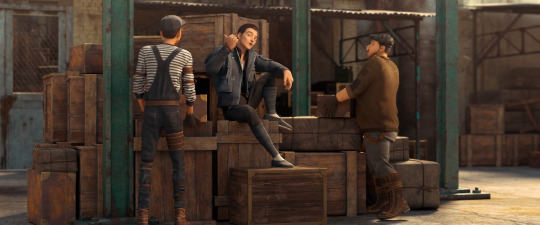
The qipao was a favored dress among women at the time, popularized by Chinese socialites and high society women in Shanghai. Flapper fashion also influenced Kasha’s outfit, blending eastern and western styles.
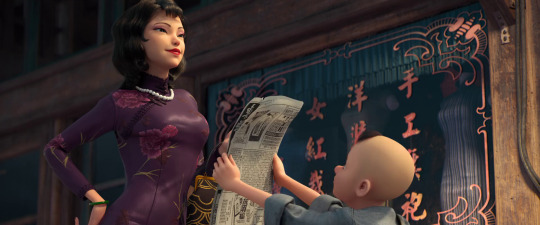
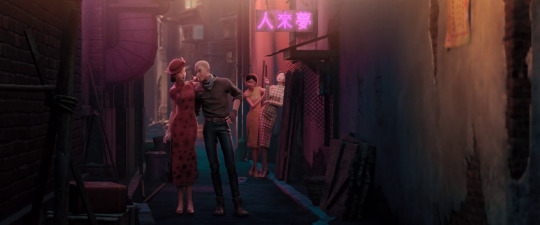

Li Yunxiang shares the same surname as the original Nezha. His brother Jinxiang’s name is also similar to Nezha’s eldest brother Jinzha. Jinxiang’s look is very typical of the republican era - complete with his center-parted hair and round glasses.
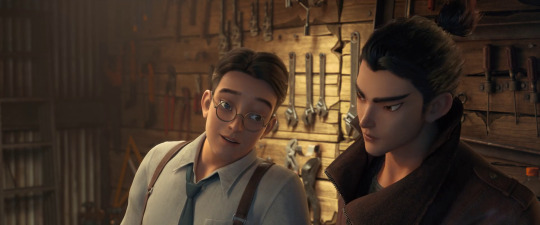
Old Li has the same temperament as Nezha’s dad, The Pagoda Bearing Heavenly King Li Jing.
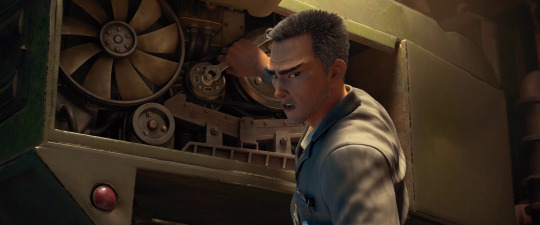
Who is Yunxiang’s adoptive sister Kasha? She’s an orphan of Belarusian descent, however not much else is known about her past. Her name means porridge in Belarusian. It might be a corruption of Katyusha (喀秋莎) with middle character removed in order to follow Chinese naming conventions idk.
If you know the history of the Republic of China, there were many girls like Kasha in that era. Her father was a soldier and left Kasha and her mother after the war.

✨Princess✨ Ao Bing~~ and the Yaksa Li Gen. Ao Bing is the third son of the Dragon King of the East Sea. The Yaksa Li Gen is the dragon king’s right hand man.

The four big clans - De, Li, Shun, Song (德家、利家、顺家、松家) - actually corresponds to the titles of dragon kings of the four seas. King De, Dragon King of the East Sea; King Li, Dragon King of the South Sea; King Shun, Dragon King of the West Sea, King Song, Dragon King of the North Sea.
A netizen looked this up and really wanted to kneel to Light Chaser for their worldbuilding.
Fun fact: the white horse from Journey to the West is the third son from the Song family.
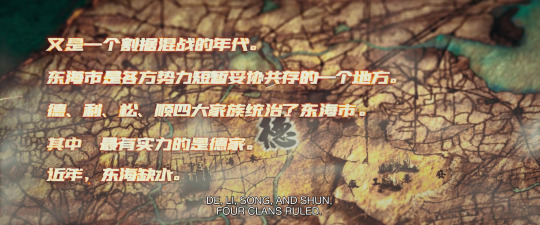
H*rley-D*vidson Darrley-Hudson product displacement on the arm of Kasha’s jacket:

Actually the film has left some hints about her past. There are some Soviet-style badges pinned to her jacket, along with some small badges that Kasha herself added as well. Since this jacket is huge, it can be assumed that it was left to Kasha by her biological father.
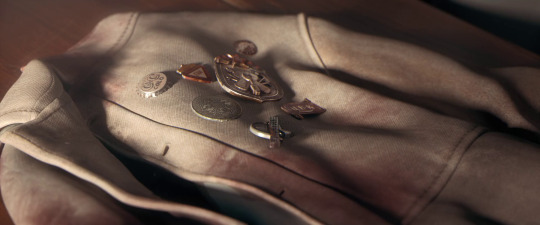
The giant buddha statue is reminiscent of the Longmen Grottoes in Luoyang, Henan.

Daddy! Ao Guang, the dragon king of the East Sea.
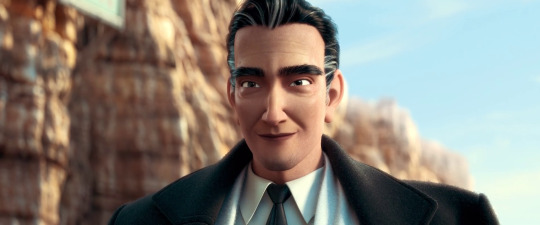
Art deco details on the hood ornament, decals and invitation card.
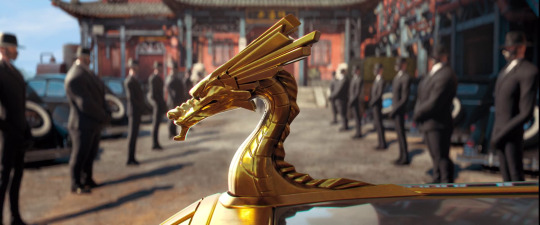
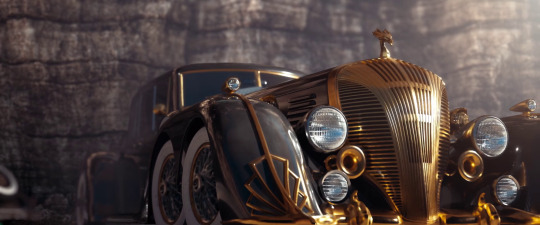

Monkey’s suit is basically a hot pink version of the Zhongshan suit, a style of menswear introduced by Sun Yat-sen during the republican era, adapted from Japanese student wear. The four pockets are said to represent the Four Virtues of propriety, justice, honesty, and shame. He's blinged up his prayer beads too.

Does this mean Dr. Su is a descendent of Su Daji, the femme fatale of IOTG? Or could she actually be Daji’s reincarnation? Now I don’t know whether to trust her or not.
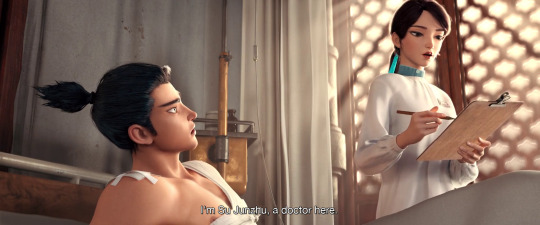
All these sea creature demons. Why? Chinese dragons are aquatic. They live underwater, and command water-based attacks, unlike western dragons who breathe fire. So it makes sense for them to control an army of demons that came from the deep.


So this is the crystal palace.

After Nezha’s death, Li Jing found out that Nezha’s mother had built a temple in his honor and burned it down because he was still angry at his son for all the trouble he caused to the family. The soul of Nezha was pissed and after his reincarnation, began to pursue his dad with the intent to kill. It took several parties to step in before matters were resolved.
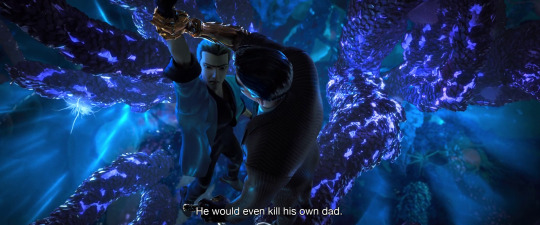
Looks like monkey likes to listen to Peking Opera.

The Pukui fan, commonly known as the cattail fan, is a fan made from palm leaves and stalks. Lightweight and cheap, it is the most widely used fan in China.

Part 2|Part 3
147 notes
·
View notes
Text
#austenread22 / persuasion final thoughts

WELL. It’s been an eventful month for this book, hasn’t it? Reading it right after Northanger felt like a nice little bookend, and made it easier to track the evolution of Jane’s writing style over the course of those 14 years. Jane the Author can never help making her presence known, but in Persuasion she becomes mostly invisible and lets Anne take the lead - which is probably why, out of all her canon, those who value the Austen’s wit and momentum find themselves a bit bored by Perusasion’s sedate and more internal tone.
I’ll be discussing points that stood out to me during my reread below the cut.
This is more of a general observation, but something that really jumps out at me is the way Jane opts for plot simplicity in this case, in favor of psychological complexity. Don’t get me wrong - all of her books evince an understanding of human nature, both as individuals and as working parts in a(n upper-middle-class) community. But S&S and P&P juggle the storylines of two sets of sisters, and Emma, as P.D. James pointed out, could have been a detective novel. They are plot-heavy works; the internal goings-on of her characters’ minds must be parsed and funneled through the domestic dramas of Wickhams and Lady Catherines and Mr. and Mrs. Eltons. As readers, we can choose to overlook the nuances and take the storylines at face-value because there is so much there already. This is impossible to do with Persuasion. What actually happens over the course of 200 pages? Anne Elliot’s family is short on money and must let their home to Admiral Croft; they go to Bath, she stays with her younger sister and cousins in Somserset, where she runs into her former fiancé; they visits Lyme; she reunites with her family in Bath, reconnects with her ex, and in the end they get back together. Sure, she has a nefarious suitor - but Mr. Elliot is no George Wickham, and her rival Louisa Musgrove is no Mary Crawford. There are no subplots to hide behind, no ruinous elopements, no potentially disastrous underhanded trickery - we must invest in Anne.
Comparing her works, I’d say Persuasion has the most in common with Mansfield and Northanger Abbey. Though sizable and full of the ups-and-downs which characterize her other, more popular works, Mansfield’s heroine is as internal as Anne - and she is easier to miss because she is reactive as opposed to proactive, dutiful, her will easier to bend in some respects.
As for Northanger, it’s a straight-forward coming-of-age novel, mostly concerned with the changes occurring within its central heroine. We may think of the coming-of-age novel as belonging to adolescents and/or young(er) adults, but I would say Anne is also coming of age during Persuasion. She is no longer young, the door of possibility seems to be closing on her forever, and we find a woman resigned, trying to find contentment with her situation in life. She isn’t old, exactly. But the bloom of her youth has passed, and like Catherine, she finds herself in an in-between - albeit with the wisdom acquired through age and life experience.
Like Northanger, the subplots are kept to a minimum, and like Northanger and Mansfield Park, Anne has (virtually) no independent fortune and so is dependent on the goodwill of others. But she is old enough to moderate that dependency, at least on an emotional level. She gets to place boundaries and abide by them; she gets to choose to whom and what she owes a duty.
Now jumping into the actual meat of the novel... I was reminded of Emma during one of our introductions to Lady Russell. I remember noticing how Emma Woodhouse was raised in the belief that to be loved, she had to be perfect. She had to live up to the ideal of being the leading lady in Highbury. Lady Russell, on the other hand, loves best those who adhere to her counsel. Of Elizabeth, we are told: “She [Lady Russell] had never received from her more than outward attention, nothing beyond the observances of complaisance; had never succeeded in any point which she wanted to carry, against previous inclination.” Unlike Anne, Elizabeth Elliot is too proud to fall under her persuasion, and Captain Wentworth, having no ties of affection, owing nothing to Lady Russell, not sharing her “value for rank and consequence, which blinded her a little to the faults of those who possessed them,” committed, during his courtship of Anne, the cardinal sin of not being deferent. “He was brilliant, he was headstrong,” we are told, and “Lady Russell had little taste for wit, and of anything approaching to imprudence a horror.” This last bit, “imprudence,” comes after a description of Wentworth’s confidence, his belief in his own abilities and his own good luck, his assurance that life will always work out in his favor. These are the qualities, I’m sure, that allow him to rise in rank and fortune, even after being disappointed in love. It is why Admiral Croft and his military friends admire him. It is also why Lady Russell and every Elliot except Anne seems to disdain him.
Sir Walter’s hatred for social climbing is as insufferable as it is hilarious. He has a bone to pick with the Navy, “first, as being the means of bringing persons of obscure birth into undue distinction,” and also because the exposure to the elements turns men ugly.
“He had frequently observed, as he walked [in Bath], that one handsome face would be followed by thirty, or five-and-thirty frights.”
And when he’s informed that Admiral Croft is coming to Bath for his gout, he greets the news with an exclamation that never fails to make me laugh out loud - “Gout and decrepitude!” - when earlier in the novel he had declared Croft the best-looking sailor he had ever come across. If given the choice between becoming dirt poor and losing his title, or losing his hair and giving in to “gout and decrepitude,” I’m honestly unsure as to which, in Sir Walter’s eyes, would constitute the lesser evil.
The subjectivity of perceived motives is constantly at play in the relationship between Wentworth and Anne. She believed herself “prudent, and self-denying” in giving him up, partly for his own good; whereas Wentworth believed “she had given him up to oblige others.” “It had been weakness and timidity,” and as a result, “her power with him was gone for ever.” In conversation, he declares “it is the worst evil of too yielding and indecisive a character, that no influence over it can be depended on.” Here, he displays a rigidity to match Lady Russell’s, except in a different direction, and we can imagine how painful it was for Anne during her original courtship to be caught between these two strong personalities, both having full conviction that they are right and that Anne must relent and see things their way, that choosing one would necessitate giving up the other.
Anne thinks Wentworth must have been “either indifferent or unwilling” to reconcile with her. “Had he wished ever to see her again, he need not have waited till this time.” Which, we later learn is actually true, so she’s not being self-pitying or imagining something which isn’t true. It is, lol. He admits to having been proud and resentful, so I think it’s fair to say that Anne’s perceptive powers are a little (a lot) sharper than his.
One of Persuasion’s most famous lines: “She had been forced into prudence in her youth, she learned romance as she grew older.” I think in my earlier readings I took this to mean that prudence and romance exist in two separate spheres, but this time around I’m inclined to believe that Anne learned to stack romance on top of prudence. It isn’t that she gave up or lessened the degree of her prudence; it’s that maturity taught her that one can be romantic and prudent. It’s the Catherine Morland/Dashwood lesson - one must learn to moderate emotion with reason. Like Elinor, experience has taught Anne the importance of letting her heart lead some of the time, and I imagine the pain of disappointed love has worked in her a softening effect. At the very least, she takes special notice of the dynamics between married and courting couples. “She always watched [the Crofts] as long as she could, delighted to fancy she understood what they might be talking of.” She becomes a voyeur of happy (happier?) families, and this is a result of not having one of her own.
It sets my blood boiling in a Mansfield way reading the way Anne is treated by her father and sisters. After letting Kellynch, Elizabeth agrees that Anne should go to Mary instead of accompanying her and their father because “nobody will want her in Bath.”
“Nobody will want her” seems to be the motto for Anne’s family dynamic, and it’s just so sad finding passages in the novel that illustrate how important it is to Anne to feel useful, how she equates usefulness with a greater chance of being loved. She believes that “to be claimed as a good, though in an improper style, is at least better than being rejected as no good at all.” And really, having her capableness acknowledged is the least anyone can do. At Lyme, immediately after Louisa’s accident, everyone is a mess without her guidance! “Anne, Anne,” cries Charles, “What is to be done next? What, in heaven’s name, is to be done next?” Um, idk guys, maybe call a doctor? In the aftermath Wentworth says “...no one [is] so proper, so capable as Anne,” and “the remembrance of the appeal [that she should stay with and tend to Louisa] remained a pleasure to her, as a proof of friendship, and of deference for her judgment, a great pleasure.”
Anne has been so used to having her opinions overlooked, her worth ground into dust, that being admired for her good sense and judgment among the Uppercross set is like a dreamy Hawaiian vacation. By no means is that party without its faults. But it is such an overdue pleasure, seeing Anne acknowledged, especially after sentences such as these, which are specific to her playing but which I contend apply to Anne in general: “She had never, since the age of fourteen, never since the loss of her dear mother, known the happiness of being listened to, or encouraged by any just appreciation or real taste.”
I think it’s important to really dig into these details about Anne, to really imagine her life as an unwanted member of her family. A lot of Austen’s heroines have to battle this foundation of trauma, actually. Even Elizabeth Bennet is her mother’s least favorite child. They all deal with it in different ways, and Anne’s method for coping sheds so much light on her character, her motivations, the reasoning behind her actions. Consider the way her mind works when she starts associating with the Musgroves: “With the prospect of spending at least two months at Uppercross, it was highly incumbent on her to clothe her imagination, her memory, and all her ideas in as much of Uppercross as possible” in order to “become a not unworthy member” of the party. Anne Elliot has trained herself from a very young age to enter a room and assess the ways to optimize her usefulness. She “clothes” her imagination. She is a chameleon, in her own understated way, and once she is aware of the role she is to play on any given occasion, the role becomes her anchor. It gives her purpose; it bolsters her resolve.
Take, for instance, the occasion when Lady Russell and the Elliots ignore Captain Wentworth at a party: “Elizabeth had turned from him, Lady Russell overlooked him; [Anne’s] nerves were strengthened by these circumstances; she felt that she owed him attention.” And she pays it - she gives Captain Wentworth his due regardless of awkwardness or difficulty or his hot-and-cold demeanor towards her. She identifies her duty, and once it is done, once she has had the reward of discovering that Wentworth doesn’t seem all that cut up over losing Louisa, she “[gives] herself up the demands of the party.”
Anne uses this process of tempering her feelings using her logical mind quite often. She’s a quintessential introvert, requiring time on her own to sort out and make sense of what she’s observed and the emotions that arise in her. She judges Wentworth’s behavior “from her knowledge of his mind.” And of her own, “she ha[s] some feelings which she [is] ashamed to investigate” when she begins to suspect Wentworth’s returning affections. She wants to believe, but she is disturbed that she cannot “understand his present feelings” and trying to make sense of them, imagining what a second chance might look like after thinking that possibility was gone, “occupie[d] and flurried her too much to leave her any power of observation.” She completely overloads, and these are the moments which make us - as readers - want to yell in all caps!!!! If we have invested in Anne, if we have believed in her as a heroine as potentially compelling as a Lizzy or an Emma, this is where that pays off.
Comic relief of the moment: Anne wishing Benwick would moderate his feelings and read less poetry 😂 (Sidebar: what would Marianne Dashwood make of Captain Benwick? 👀)
Want some more clownery? Wentworth inwardly swearing that Anne has no more power over him in the same chapter, in the same page I believe, as this: “Anne Elliot was not out of his thoughts, when he more seriously described the woman he should wish to meet with. ‘A strong mind, with sweetness of manner,’ made the first and the last of the description.”
In actuality, Wentworth has no damned idea what he’s talking about. The concept of strength is also discussed quite a bit in Perusasion, using Anne and Louisa, and to a different extent, William Elliot, as different modalities of strong-mindedness. “I am determined I will” is a line of Louisa’s, and I think it sums up her character quite well. Anne and Mrs Croft consider her fall in Lyme as “the consequence of much thoughtlessness and much imprudence,” and it is very hurtful to Anne to feel herself wanting in Wentworth’s eyes over a matter upon which she believes herself deeply misunderstood. Stubbornness is not strength in Anne’s book. Before his treachery is known, she describes Mr Elliot as “never run away with by spirits or by selfishness, which fancied itself strong feeling.” Clearly, Anne has Louisa in mind when she is thinking this, and on another occasion, she defends Benwick to Admiral Croft when he relates his engagement to Louisa: “She...only meant to oppose the too common idea of spirit and gentleness being incompatible with each other.” Anne knows what people think of her. Here, she reminds of me Jane Eyre, who famously said, “Do you think, because I am poor, obscure, plain and little, I am soulless and heartless?” Anne has a whole world inside of her, a strong mind and strong feelings, and though, like her playing, she has had to content herself with pleasing only herself, not counting on others to give her love and validation, she would like to be valued. She would like to be loved. And this is why the loss of Wentworth hurts so much, because Wentworth recognized her from the start. He saw her worth; he fell in love with her, not because of her usefulness, but because of who she is as a person. “Once so much to each other! Now nothing!” “...There could have been no two hearts so open, no tastes so similar, no feelings so in unison, no countenances so beloved.”
And so, to win back Anne, Wentworth has to learn “to distinguish between the steadiness of principle and the obstinacy of self-will, between the darings of heedlessness and the resolution of a collected mind.” Anne is not weak. She did not break her engagement because Lady Russell was too strong. Anne broke it because she considered it best. Because her instinct is to do what’s best regardless of the cost. Like Fanny Price, when she is certain of being right, she will withstand all kinds of social displeasure. Anne herself tells us within the narrative that she ended things with Wentworth because the cons outweighed the pros. And then we get to meet her old school friend Mrs Smith and we see with our own two eyes what her future might have been like, how dire is the situation of a woman alone in the world after making the wrong choice of husband. Anne is not a coward, Anne was not being overly cautious. Anne was being prudent, employing that good sense no one of her acquaintance can deny. Is it romantic? Maybe not the way Wentworth sees it. But Wentworth is a man, a man of a particular kind of character. He will never fully understand Anne’s reasons, but Austen herself never doubts them.
Let’s circle back now to one of my favorite Austen Tropes - the dysfunctional family. We’ve already established that the last member of Anne’s family to truly love her was her deceased mother. Her father is a vain snob, and because he is a vain snob, the only daughter he pays attention to is Elizabeth. Elizabeth is beautiful and very much like him, which I’m sure is catnip to a narcissistic personality. The other object of their contempt is Mary, who didn’t marry as well as she could have and is thus unworthy of their attention. Mary is without Anne’s good sense, and so she is often jealous, competitive with her mother-in-law and constantly meddling in Louisa and Henrietta’s prospects. Despite this, I feel quite sorry for Mary and I don’t dislike her, not the way I dislike Elizabeth. Anne serves a big contrast here as well. She observes the marital happiness of the Crofts and the Harvilles; sees the bond of friendship between the admiral, Wentworth, Harville, and Benwick; observes the imperfect but warm contentment of the Musgrove family... and “though she sighed as she rejoiced, her sigh had none of the ill-will of envy in it.” To a number, they are all her inferiors in class and station, yet “how much more interesting to her was the home and friendship of the Harvilles and Captain Benwick, than her own father’s house in Camden Place, or her own sister’s intimacy with Mrs Clay.” She values people for who they are, their character, their treatment of others, and ergo she rejoices in their joy. She doesn’t resent their triumphs. Even when she believes Wentworth’s marriage to Louisa is a done deal, she thinks of Uppercross and imagines it full of “all that was glowing and bright in prosperous love, all that was most unlike Anne Elliot!” Maybe she’s being a little maudlin and self-pitying here, but she never lays the blame on Louisa’s door, never besmirches her as a woman. So, no, Anne is not blind to the follies of others, and she does smile to herself, does remark upon the ridiculousness of her acquaintance, but only in the privacy of her own thoughts, and never to the point of endangering her ability to be civil and proper and all that she ought to be, socially. That isn’t Anne’s way. A woman who has spent her life being subjected to throwaway comments like “Oh, she’s nothing!” knows all too well the power and effect of words.
One of my favorite moments in the novel is when Elizabeth and Sir Walter enter the Musgroves’ room at the inn in Bath and everything goes silent. “Anne felt an instant oppression, and wherever she looked saw symptoms of the same.” Not only does this prove how truly annoying Elizabeth and Sir Walter are, but it’s nice to have Anne’s feelings confirmed by those around her. She isn’t imagining it - her dad and sister are that bad.
Sir Walter is probably the Austen character most concerned with appearances. He spends a lot of lines judging the looks of both men and women, which is why I think it’s no small detail that Anne grows in beauty throughout the course of the plot. Though she’ll never be as attractive as her older sister, we are told that Wentworth once thought her pretty, that he was surprised to see her looks so changed since their last meeting. She goes from looking frail, like a wilted flower past its bloom, to “improved in plumpness and looks.” Regaining hope of Wentworth and the making of new friends - friends who respect and have real affection for her - has done it, and when she becomes certain of Wentworth, when she is sure that his affections still lie with her, “her eyes were bright and her cheeks glowed; but she knew nothing about it.” Her happiness, Austen says, is from within, and it is made of sturdier stuff than mere youth and unlined skin. Even a woman past her bloom may still grow into beauty; all she has to do is find her own definition of happiness. (Meanwhile, the sycophantic Sir Walter and Elizabeth Elliot will always find themselves an oppressive nuisance despite their good looks.)
Now we move into the plot of Mrs Smith, who rightly said, “There is so little real friendship in the world!” In her, we see one of Anne’s possible futures, a future not uncommon for 19th century women who have fallen out of favor through poor widowhood. Unlike the Bateses in Emma, Mrs Smith has no one to help her until Anne, and her situation is truly uncertain. Nevertheless, Anne observes in her an “elasticity of mind” which Anne also possesses - emotional resilience, as a modern psychologist would say. They have a “disposition to be comforted, that power of turning readily from evil to good, and of finding employment which [carries them] out of [themselves].” Even if she hadn’t reunited with Wentworth in the end, I have a feeling Anne would be okay and Mrs Smith would somehow find a way to continue making it through. Their inner strength is consistent, steady, not overtly optimistic, but reliably practical. Still, through Mrs Smith we have the reminder that Anne (and any woman, really) is wise to be cautious in matters of marriage and love.
Interestingly, despite being snobs themselves, Lady Russell and Mr Elliot do not find fault with Anne for maintaining a friendship with Mrs Smith. On the occasion of Anne’s declining a dinner invitation, and being curious as to what transpited in her absence, her “greatest interest must be, in having been very much talked of between her friend [Lady Russell] and Mr Elliot; in having been wished for, regretted, and at the same time honoured for staying away in such a cause.” Again, we see how much Anne wants to be valued. We also see that in the Scale of Snobbery, Elizabeth and her father are on a whole other level. (Or, it could just be Elliot being a scheming sneak.)
On the subject of Elliot being a scheming sneak, Jane Austen never makes us feel we should condemn Anne, or any of her heroines for that matter, for being fond of male attention. Anne is flattered by Mr Elliot’s interest, until he refuses to take a hint. And she does turn over in her mind the prospect of being of use to her family, and of reclaiming her dear mother’s position as mistress of Kellynch Hall. But ultimately these inducements aren’t enough to make her act against her conscience - which is the same thing she did with Wentworth the first time around. The truth is, she knows she can’t trust William, and she knew it before Mrs Smith reveals the truth of his plan to weasel into the Elliots’ lives to ensure Sir Walter wouldn’t marry Mrs Clay. Anne has always “felt that she could so much more depend upon the sincerity of those who sometimes looked or said a careless or a hasty thing, than of those whose presence of mind never varied, whose tongue never slipped.” Austen herself is wary of appearances. All of her villains are outwardly charming, they all hide their bad intentions underneath the kind of facade that is valued by society at large - good looks, flattery, wit. Our human propensity to fall for such trappings is what makes us ignore the value of a Fanny or Anne, what makes us unwilling to unlock the great goodness found in men like Darcy and George Knightley. Anne is such a skilled reader of people that even when she couldn’t pin down what was wrong, she knew something was. She listened to her gut, she was not guided by either Elliot’s persuasions or Lady Russell’s - though she admits that she might have been induced, I choose to believe that Anne would have stuck to her guns.
Austen makes interesting commentary through Anne and Mrs Smith during this discussion of Mr Elliot. Anne says, “In marrying a man indifferent to me, all risk would have been incurred, and all duty violated.” It seems to me that while Jane condemns mercenary marriages, she does acknowledge uneven unions - the love match is the ideal, the purest form of matrimony, but financial considerations mean that in a lot of cases, marriages will occur between people not in love. And it isn’t the not being in love that Austen objects to, it’s the contracting of marriage for the wrong motive, or marriage where one or both parties is being deceitful. In either case, it is the woman who has the most to lose, and so marrying a man indifferent to her would not only be morally wrong to Anne, but it would also put her in the position of most risk.
Before I bring this eternal compilation to a close, I would like to share two more of my favorite bits of dialogue, the first courtesy of our beloved Captain Fred:
“Now I have done,” cried Captain Wentworth. “When once married people begin to attack me with,—’Oh! you will think very differently, when you are married.’ I can only say, ‘No, I shall not;’ and they say again, ‘Yes you will,’ and there is an end of it.”
MOOD.
And another Laugh Out Loud moment, brought to you by Elizabeth Elliot:
“I really cannot be plaguing myself for ever with all the new poems and states of the nation that come out. Lady Russell quite bores one with her new publications. You need not tell her so, but I thought her dress hideous the other night. I used to think she had some taste in dress, but I was ashamed of her at the concert. Something so formal and arrange in her hair! and she sits so upright! My best love, of course.”
....all I can say to that is -
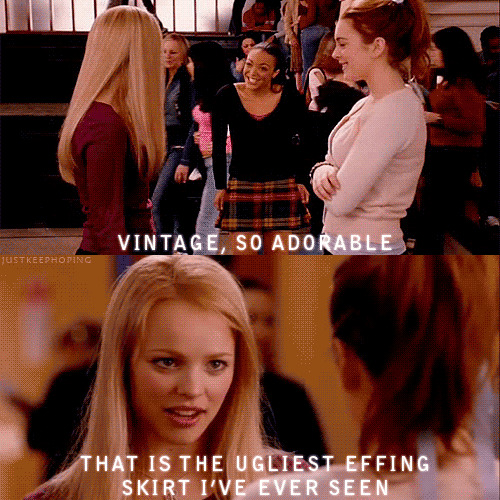
tagged: @lostandfound922, @thatscarletflycatcher
#austenread22#persuasion#anne elliot#jane austen#book club#sense and sensibility#pride and prejudice#mansfield park#emma#northanger abbey#sanditon
198 notes
·
View notes
Text

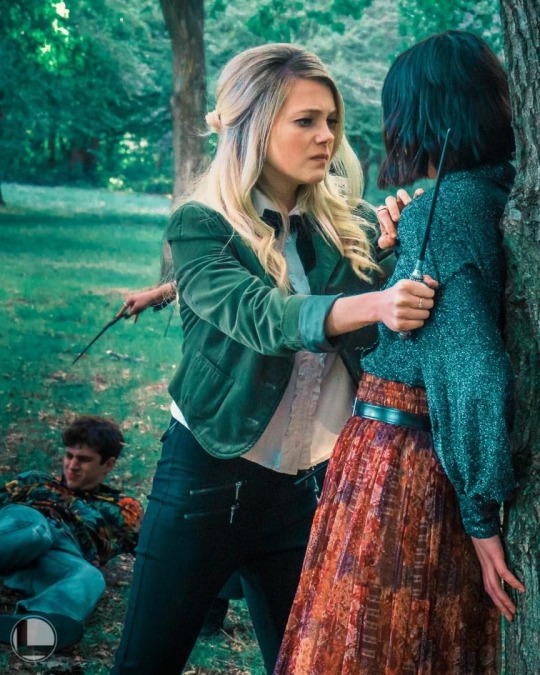
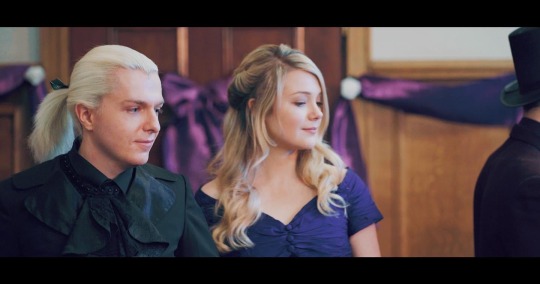

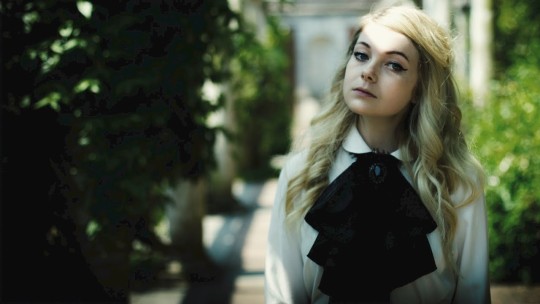
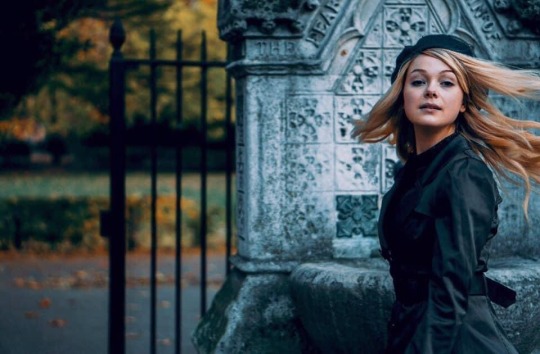
Narcissa Black (Malfoy) Headcanon - Noble House of Black - Black sisters
As the baby of the family, Narcissa was spoiled at a young age by her sisters and parents and given the best of everything.
She wasn't given as much pressure as the eldest sister Bellatrix, nor sidelined like the middle sister Andromeda, and had a relatively blissful childhood.
Being naturally lady-like and elegant, she was very popular among the pure-blood circles and considered an eligible match for many young heirs.
She bore a physical resemblance to her mother Druella and was favored by her.
The most feminine of the three sisters, she delighted in choosing clothes and makeup, learning dancing, and was often mocked by Bellatrix.
However, like other Blacks, she was also not free from the stringent expectations placed on her to uphold her pure lineage.
Luckily for her, she found a love match in the wealthy Lucius Malfoy, much to the pleasure of her parents, and they were a couple since their Hogwarts years.
She wasn't as gifted in magic as her older sisters but had a more personable, smooth personality that endeared others.
She was also a Slytherin through and through, loyal to her family, cunning and self-serving, and a true pure-blood at heart.
She aligned with the Death Eaters mainly due to her husband Lucius, but disliking violence, never became a Death Eater herself.
She was always a bit awed by her sister Bellatrix's prowess, but Lucius told her Bellatrix was honoring their cause and upholding the glory of pure bloods.
She did not aspire to a glamorous career but instead chose to be a loving wife and mother.
She was very prominent among pure-blood circles, and often had tea and socialized with other pure-blood women.
She was embarrassed by the scandal her sister Andromeda caused and stopped talking with her after her marriage to Tonks.
She was occasionally also intimidated by Bellatrix's extreme behavior, as she no longer recognized the sister she once knew.
She was as bigoted as her sister and husband and viewed Sirius and Andromeda as traitors to their family.
Despite not being physically the strongest, she had a hidden inner strength, that came from her love for her family, and her status as a proud Black and Malfoy.
Like her husband, she was elegant and refined, relishing the finer things in life and placing a great deal of emphasis on wealth and status.
Her signature color was green, the color of her Hogwarts house that perfectly matched her sleek, blond hair.
Her wedding was the happiest day of her life, and many prominent figures across the wizarding world came to attend.
She couldn't understand why Bellatrix wouldn't want to be a mother, or why Andromeda threw her life away for a Muggle-born Hufflepuff.
As time went on, she grew apart from her sisters, focusing more on her new family, particularly her son Draco, who she doted on.
Initially, she didn't know the full extent of what Death Eaters did, and thought Voldemort treated his Death Eaters with respect and rewarded them with glory.
Lucius kept many secrets of Death Eaters from her, and she thought aligning with Voldemort was the best way to keep her family safe.
She was a good Occlumens, being subtle and good at masking her emotions, so it was very hard to read her feelings.
#harry potter#harry potter headcanon#harry potter fandom#harry potter fanfiction#hp headcanon#narcissa black#narcissa malfoy#black family#noble house of black#noble and most ancient house of black#wizarding world#slytherin#malfoy family#death eaters#second wizarding war#first wizarding war
12 notes
·
View notes
Text
RE8 Ladies of the Village and their “Signature Scents”
Inspired by a recent post by @ctitan98, I have researched and determined that the Ladies of RE8 wear the following perfumes. I’ve included my interpretation of their romantic and sexual preferences (no hetero!), as well as discussion of their personalities.
(1) Mother Miranda (grey-romantic pansexual)
Mother Miranda does not usually wear scents. As a scientist, she is keenly aware of how scents may interfere with her work, and thus generally avoids wearing perfumes or any scented body wash. Her daily scent is somewhere between a cross of Ecolab hospital cleaner and decay (cuz she’s a moldy bird). Her keen bird senses also make her more sensitive to smell. However, as a deity, Mother Miranda will occasionally deign to wear her signature perfume, Selection Verte, when forced to engage with others. A unisex scent released in 1901, Selection Verte was also worn by Freud and is geared towards “intuitive and insightful” individuals (aka - the master manipulator). It is an incredibly simple scent for a very complicated goddess.
Selection Verte / Unisex / 1901
Henry Creed Fourth Generation
Citrus Aromatic
Top Notes: Citruses, Neroli, and Pepper
Middle Notes: Mint and Herbal Notes
Base: Ambergris
(2) Lady Alcina Dimitrescu (homo-romantic lesbian)
Cuir de Russie, or Russian leather, was an extremely popular scent at the end of the 19th Century and early 20th Century. This provocative and shocking perfume was specifically created for women who dared to smoke cigarettes in public, which many viewed as truly scandalous in that era. As a single woman smoking cigarettes and performing jazz in the 1930s, the Lady most certainly would have worn this scent both before and after her Cadou implant. Though now discontinued, you can be sure the Lady has bottles stored somewhere in her castle.
The composition starts with aldehydes moderated by mild nectar of classical trio – rose, jasmine and ylang-ylang. The ending comes as smoky, animalistic note of dark leather. The main notes are orange blossom, bergamot, mandarin, sage, iris, jasmine, rose, ylang-ylang, cedarwood, vetiver, styrax, leather, amber and vanilla.
Les Exclusifs de Chanel Cuir de Russie 1924 / Women / 1924
Chanel
Warm Leather
Top Notes: Clary Sage, Orange Blossom, Bergamot, Lemon, and Mandarin Orange
Middle Notes: Iris, Ylang-Ylang, Carnation, Vetiver, Jasmine, Rose, and Cedar.
Base notes: Leather, Birch, Tobacco, Musk, Amber, Heliotrope, and Vanilla.
(3) Bela Dimitrescu (demiromantic bisexual)
IMO, Bela is a transwoman who idolizes her mother, so she, too, tends to prefer classic, complex, and heavier scents. It certainly helps to cover the scent of blood and death that clings to her and her sisters (though, here, too, I imagine that Bela is a bit tidier than her siblings). Bela selected this perfume as soon as the Duke brought it by in 1955 and has refused to wear any other scent since.
Youth Dew / Women / 1953
Estee Lauder
Amber Spicy
Top Notes: Spices, Aldehydes, Narcissus, Lavender, Orange, Bergamot, Peach
Middle Notes: Spicy Notes, Cloves, Cinnamon, Rose, Ylang-Ylang, Jasmine, Lily-of-the-Valley, Cassia, and Orchid
Base: Incense, Tolu Balsam, Peru Balsam, Oakmoss, Patchouli, Amber, Vetiver, Vanilla, and Musk
(4) Cassandra Dimitrescu (aromantic bisexual)
In sharp contrast to her older sister, Cassandra disliked being forced to wear a perfume or cologne. When she finally bent to her mother’s demand that she “bathe more often or cover [her] putrid scent with something” before Mother Miranda’s visits, she selected a scent that reminded her of hunting in the woods after a chilly autumn morning. She now wears it almost daily, much to the relief of everyone around her.
Chypre Mousse / Unisex / 1914
House Oriza L. Legrand
Chypre (or Citrusy-Earth based scent)
Top Notes: Mint, Clary Sage, Fennel, and Green Notes
Middle Notes: Oakmoss, Galbanum, Angelica, Fern, Clover, Mastic or Lentisque, and Violet Leaf
Base Notes: Oakmoss, Vetiver, Pine Tree Needles, Boletus edulis, Vetiver, Chestnut, resins, Pine Tree Needles, Labdanum, and Leather.
(5) Daniela Dimitrescu (panromantic pansexual)
Of all the ladies on this list, Daniela’s taste in perfumes is the flightiest – varying nearly as frequently as her taste in suitors. Generally, Daniela prefers sweet, sugary scents, which sometimes (frequently) clash with her disheveled, bloody look, petrifying castle staff even more (“How can someone be so evil and smell so sweet?!?”). Daniela’s current favorite perfume is a recent, limited-edition release called Strength from Andromeda’s Curse. She may have only picked it for its brand name...
Strength / Women / 2017
Andromeda’s Curse
Sweet
Notes of Coffee, Frosting, Marshmallow, Whipped Cream, Coumarin, Milk, Brown Sugar, Vanilla, and Chocolate.
(6) Lady Donna Beneviento (demiromantic demisexual)
IMO, Lady Donna Beneviento is the newest Lord in the village, so her perfume preferences are less dated than most of the ladies on this list. Given her powers with the yellow flowers, it is unsurprising to many that this Lady prefers a floral fragrance. Per Fragrantica.com, Poeme, by Lancôme is a
[c]lassic floral oriental fragrance launched in 1995. The structure of Poeme is original, does not follow classic structure of top, middle and base notes. The notes of the composition are appearing alternately, like echo. The composition features intoxicating Himalayan blue poppy, white and yellow flowers (mimosa, rose, freesia...) and vanilla flower. Poeme is a poem in the world of perfumes; the contrasts of bitter and sweet create a special sensual aura. The bottle with this miraculous bitter honey is a synthesis of the contrasts – attractive curves and straight lines.
Other notes include: Narcissus, Datura, Peach, Plum, Mandarin Orange, Black Currant, Bergamot, Green Notes, Tuberose, Ylang-Ylang, Orange Blossom, Jasmine, Heliotrope, Rose, Leather, Vanilla, Amber, Tonka Bean, Musk, and Cedar.
#re8 village#re8 mother miranda#re8 alcina#alcina dimitrescu#resident evil village#resident evil 8#resident evil shitpost#Donna Beneviento#re8 donna#re8 daniela#daniela dimitrescu#cassandra dimitrescu#re8 cassandra#re8 bela dimitrescu#re8 beneviento#re8 dimitrescu#mother miranda#bela dimitrescu#resident evil alcina#perfume#signature scent#resident evil
67 notes
·
View notes
Text
Frozen is a Much Stranger Movie Than I Remember: A Retrospective
I feel like Frozen is one of those movies where there’s two camps: It’s indefensively bad because it was obnoxiously popular and there’s nothing good about it, or ignoring the haters because they’re haters and loving every piece of it (or camp three who don’t give a damn one way or another). The music was all over the internet ad nauseam, yes, but I see a different problem with Frozen:
Anna is our hero and this movie has no idea what to do with her, so it punishes her.
Frozen’s musical numbers do a lot of the legwork to make it seem like a better story than it is, and people have ripped apart Hans in the decade plus since its release. We all know he’s a terrible twist villain consistently at the top of “worst twist villains” lists. We all know Elsa was originally supposed to be the villain but “Let it Go” sent the writers into a panic spiral and they just couldn’t bear keeping her the bad guy. We know the parents are kinda shady? And the movie just ignores that.
But upon a rewatch because “Love is an Open Door” was stuck in my head… the premise for so much of this movie is so much weirder and nonsensical than I remember and in all the discourse I’ve seen over the years, it gets mostly ignored in favor of attacking the songs and Hans.
The prologue (after the ice cutters bit) where young Elsa and Anna are building the snowman and Elsa accidentally almost murders her sister, which leads to the rush to the rock trolls and the Worst Parenting Advice in a Disney movie.
Side note: Baby Elsa and Anna could be triplets with Vanellope von Schweetz, they have the exact same faces. And it’s the middle of the night when they’re supposed to be sleeping but Elsa sleeps with a headband on and their parents apparently also sleep in full royal regalia, complete with a tiara for Queen Whats-her-face?
Then you get the “Do You Want to Build a Snowman?” montage where the parents die, Anna grows up, and Elsa sinks further into paranoid anxiety. All of this sets up Anna’s clueless naivete that leads her into insta-romancing Hans and ignoring all of the warning signs (that weren’t there but the movie punishes her anyway).
Anna and Elsa did not grow up as orphaned peasant girls living in the countryside. Anna is isolated from her sister, yes, but she lives in a castle filled with guards, maids, kitchen staff, and presumably has an army of tutors who educate her on booksmarts, how to ride her horse, how to be a proper court lady, and how to eventually lead the country Elsa abandons.
A regent of some kind is running Arendelle until Elsa’s of age to become queen, right? Where is he? Or she?
Where the f*ck are all these servants?
Did Ana not make a single friend with any of her maids’ daughters or sons? Does she not have a tutor or teacher she absolutely adores? How did this entire castle not have a single person to mentor this poor naive girl in how to have interpersonal relationships so their future queen doesn’t get manipulated into marriage by a gaslighter?
If I’m a citizen of Arendelle and Hans becomes my new king and he’s absolutely terrible in every way, and I hear the reason why is “well our immature queen (who we didn’t educate at all on politicking) got duped and bamboozled into marrying him with zero resistance or question,” I’m not going to be too happy with my government.
Anna is kept in the dark by Elsa and her entire invisible and inconsequential staff of servants and is punished by the narrative when she tries to reconnect with her sister, desperately wanting to rekindle their relationship. She literally had her memory wiped. Where’s all the intervening adults saying “uh, hey, Anna, Elsa doesn’t actually hate you, she’s just a danger to herself and everyone around her and we’re complicit in doing nothing to help her.”
Elsa makes it clear she wants nothing to do with her sister in her little ice castle, and Anna refuses to let her go. Then Elsa intentionally hurts her to make her leave and every other character basically says “I told you so,” as if this is her fault.
She’s punished further by the narrative when Hans, the guy who seems amazing to everyone, including the audience, randomly and inexplicably betrays her. Anna is not given the agency to figure this out for herself. She doesn’t beat Hans to it, realizing something doesn’t add up and have the epiphany that she “can’t marry a man she just met”.
Disney, you can still have a twist villain and let the heroes do their due diligence in discovering so, even seconds before they would have revealed themselves.
So Anna gets suckerpunched and Elsa has to go save her and we get the little Elsa redemption and Anna gets to punch Hans off the boat and still fall in love with a man she just met, Kristoff. Movie’s over, happy ending, roll credits.
Frozen sits at the cusp of that Disney era where they’re trying to be all cool and self-aware by insulting their own movies, and by proxy, the audience who loves said movies, with the whole “bashing the insta-romance,” in a serious case of lampshading.
The messages this movie I think tries to send are quite explicitly stated:
“Only true love can thaw a frozen heart” (which absolutely should have been Elsa’s frozen heart, not Anna’s)
“Some people are worth melting for”
“You can’t marry a man you just met”
The problem is that Frozen botches every single one.
Without any indication that Elsa is capable of being “saved” or even wanting to be “saved” Anna gives her life in the name of an apparently unrequited love. Anna might have not fully given up on her sister, but given the evidence presented to her, she really should have, for her own safety. Some people are not worth melting for, Anna, and your castle of thumb-twiddlers failed you on understanding that.
The writers realized that without Elsa as their villain, they needed something in her place, and that mutated into Hans, but they had a much better villain from the start: The parents.
The parents who are ashamed of their own daughter’s violent condition and instead of treating her and helping her, they force her to hide and smother her ice, rip away her sister, and make her feel compelled to isolate herself in her room for fear of hurting people.
The parents who left no instruction or contingency plan in the event of their untimely demise, no senior staffer to take over raising their daughters, no adult figure to help them both become effective leaders.
Anna is our hero and her story boils down to “young girl nearly dies in an innocent accident caused by sister, has her memory of the incident erased and her sister then inexplicably isolated from her, believing the sister to hate her for no reason. She grows up, apparently, with no friends and no mentors and when presented with the chance to finally reconnect with her estranged sibling, through no fault of her own, causes said sibling to erupt in a violent panic attack and flee the premises. Meanwhile, after a touch-starved and emotionally stunted childhood, she quickly falls for the apparent man of her dreams who’s perfect in every way, and she leaves him in charge while she chases after her equally victimized sister on a dangerous quest. The sister, predictably, hurts her again, everyone says “I told you so,” and the man who she thought was perfect is suddenly a completely different person who takes advantage of her naivete because… girls in love are dumb? She nearly dies hoping her now-abusive sister wants to save her and when she does, she’s immediately forgiven.”
I’m not going to talk about Frozen 2 here, because it treats Anna no better. This movie is just baffling in its messaging.
Without properly addressing the Terrible Parenting Advice, Frozen suggests Elsa’s parents did the right thing, or at least the best they could, in traumatizing and isolating their daughter and teaching her to hate herself and fear her powers.
Without any evidence of Hans’ true intentions, Anna is either a dumbass for not being clairvoyant or, what, she should learn to be skeptical of everyone she meets out of fear that they’ll become another Hans?
By making Elsa freeze Anna after finally liberating herself from her trauma shackles, all Elsa’s anxious fears about hurting the people she loves with her ice come true. Because the plot resolves with Elsa saving Anna, instead of the other way around, Elsa must hurt her sister before she can help her, and in 5 seconds she’s cured.
If I was going to rewrite Frozen, since Disney sure loves generational trauma now instead of actual villains, my Frozen would look something like this:
Our hero Anna and our villain Elsa are royal sisters. Keep the same first 30 mins or so, up to Elsa fleeing the castle. Anna, after being kept in the dark by her parents and servants for her whole life, must uncover why her sister has these powers and why her parents, whom she loved and adored, abused Elsa. Elsa becomes the victim she is, still gets her “Let it Go” moment, but instead of the “it” being just her shackles, it’s the abuse of her parents, and her coming to terms with understanding just what they did to her and how wrong they were.
Anna then gets to chase after her and you still get the oopsie where Elsa attacks her, but this time it’s a near-miss that still terrifies her and sends Anna away. The missing parental figure who should have raised her and Anna (but still had their own flaws, and could have done better), stays behind and starts to break through Elsa’s frozen heart and helps her understand that her condition does not control her, that she can still fix this, that she isn’t the villain her parents made her out to be. Elsa doesn’t want to listen, she’s convinced nothing can now be done. She is doomed, but returns home anyway to face the consequences of her actions at the ball.
Anna returns home and figures out that Hans is phony and means to betray her and she beats him to it, regaining her agency along the rest of the plot and maturing in her understanding of the complex and conflicting depth of the people in her life. And it’s Anna, not Elsa, who breaks the “frozen heart” of her sister, by still loving her unconditionally despite her ice, and it’s Anna’s love, not Elsa’s, that helps Elsa control her powers and learn to appreciate them.
And, she can still have Kristoff in the end, why not?
TL;DR, Frozen is the product of catchy musical numbers too expensive to cut because they’ve already been animated, dominating the storytelling process that results in a troubling, nonsensical plot with mixed and frankly disturbing messages. But hey, they sold some Elsa dolls and dresses and racked up billions of views on YouTube, didn’t they?
14 notes
·
View notes